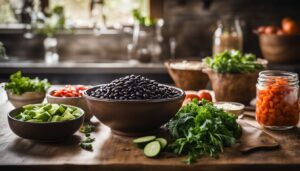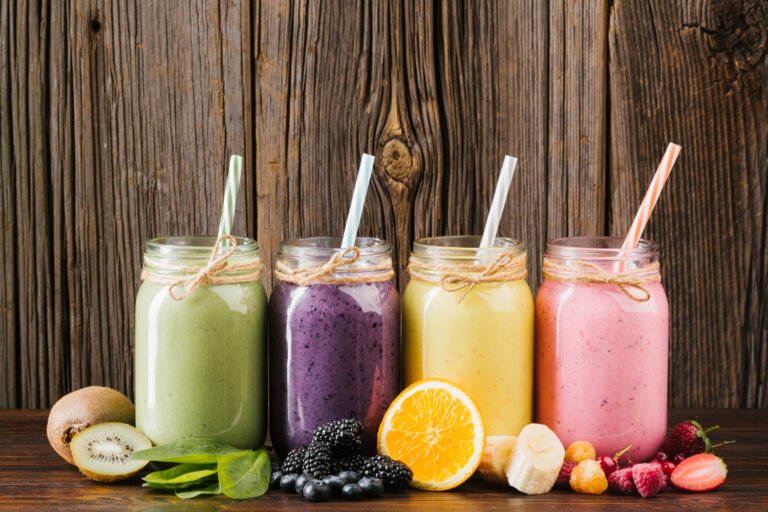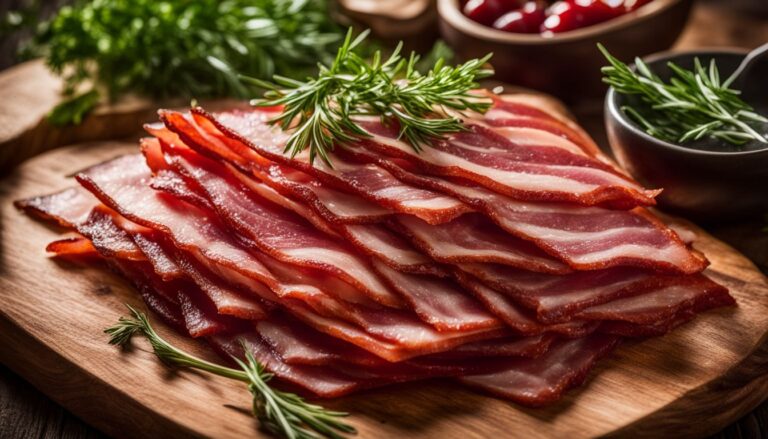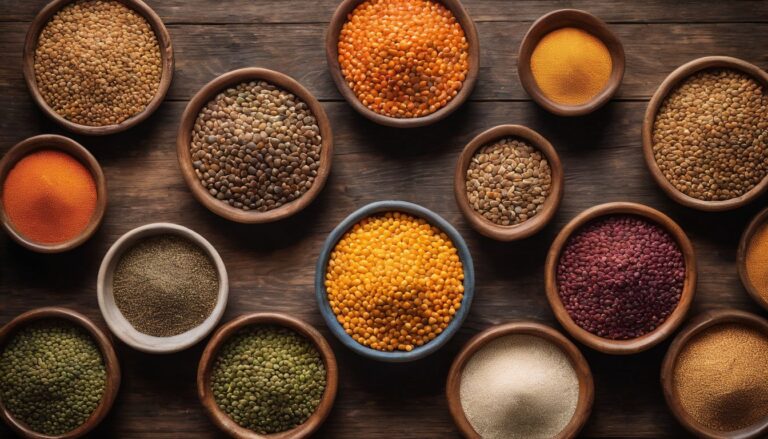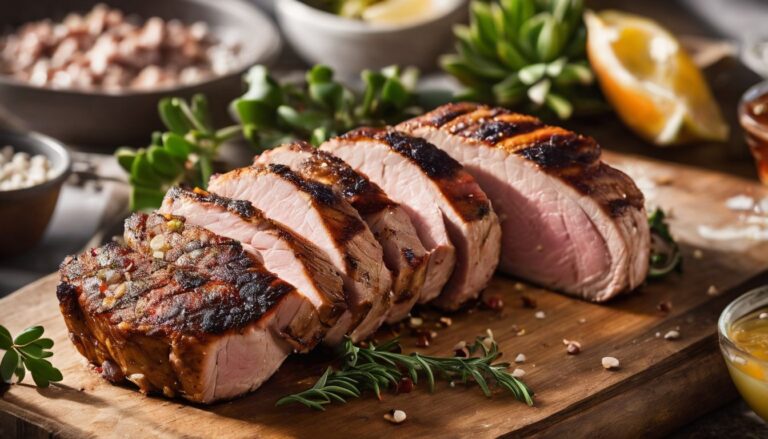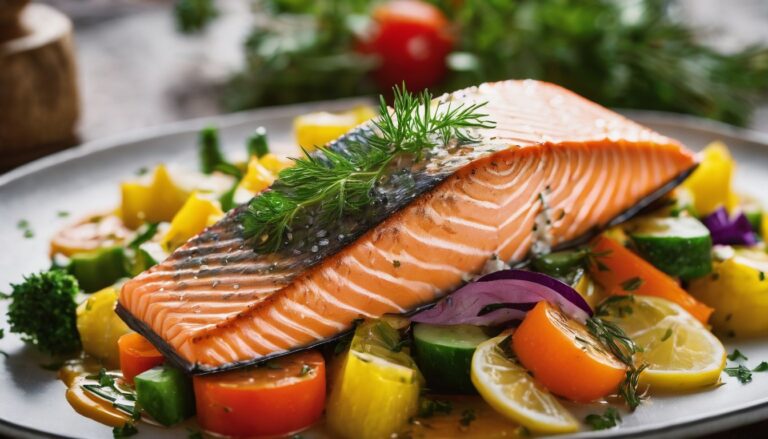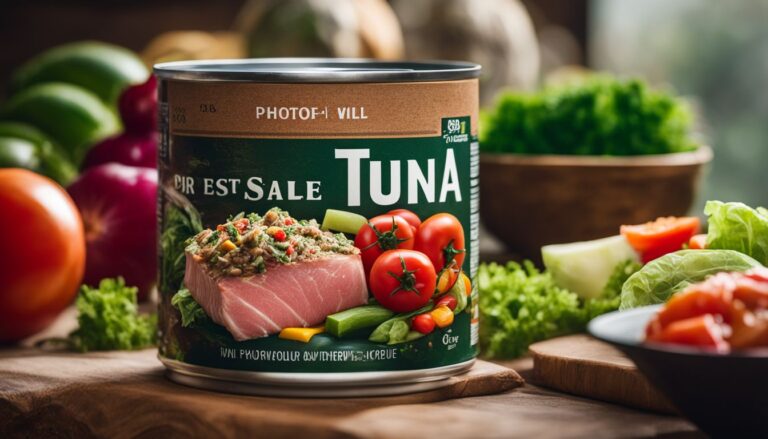40 High Protein Low Calorie Foods For A Healthy Diet
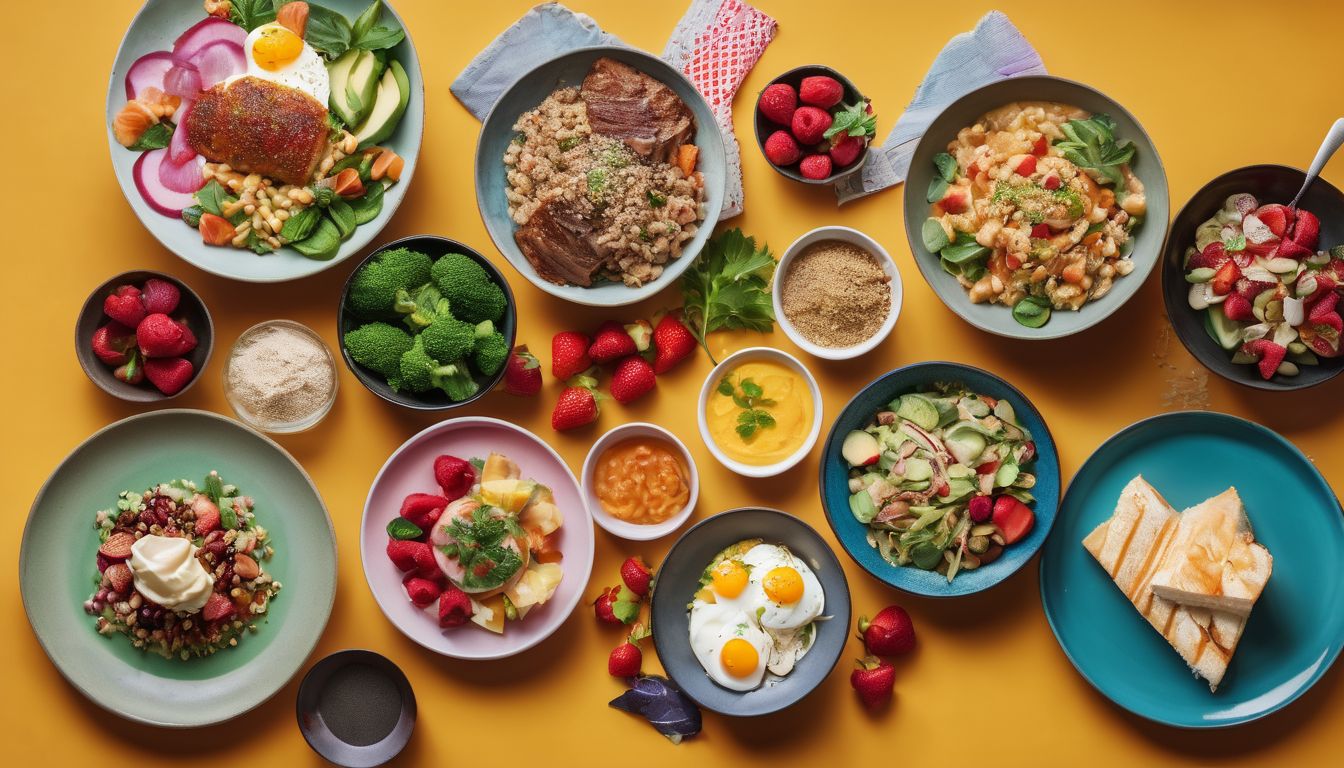
Adopting a healthier diet can feel like an uphill battle, especially when it comes to finding foods that are both high in protein and low in calories. Did you know protein is essential for repairing body cells and building muscles? This article will guide you through ten high-protein, low-calorie foods that not only help with weight management but also keep you feeling full and satisfied longer.
Get ready to revamp your nutrition plan as we dive into these power-packed foods!
Key Takeaways
- High-protein, low-calorie foods like chicken breast and tofu are excellent for promoting muscle growth and repair.
- Including high – protein options in your diet can help you feel full and satisfied for longer periods of time, aiding with weight management.
- Foods such as lentils and shrimp provide a balance of nutrients while keeping calorie intake in check.
The Importance of High Protein and Low Calorie Foods in a Healthy Diet
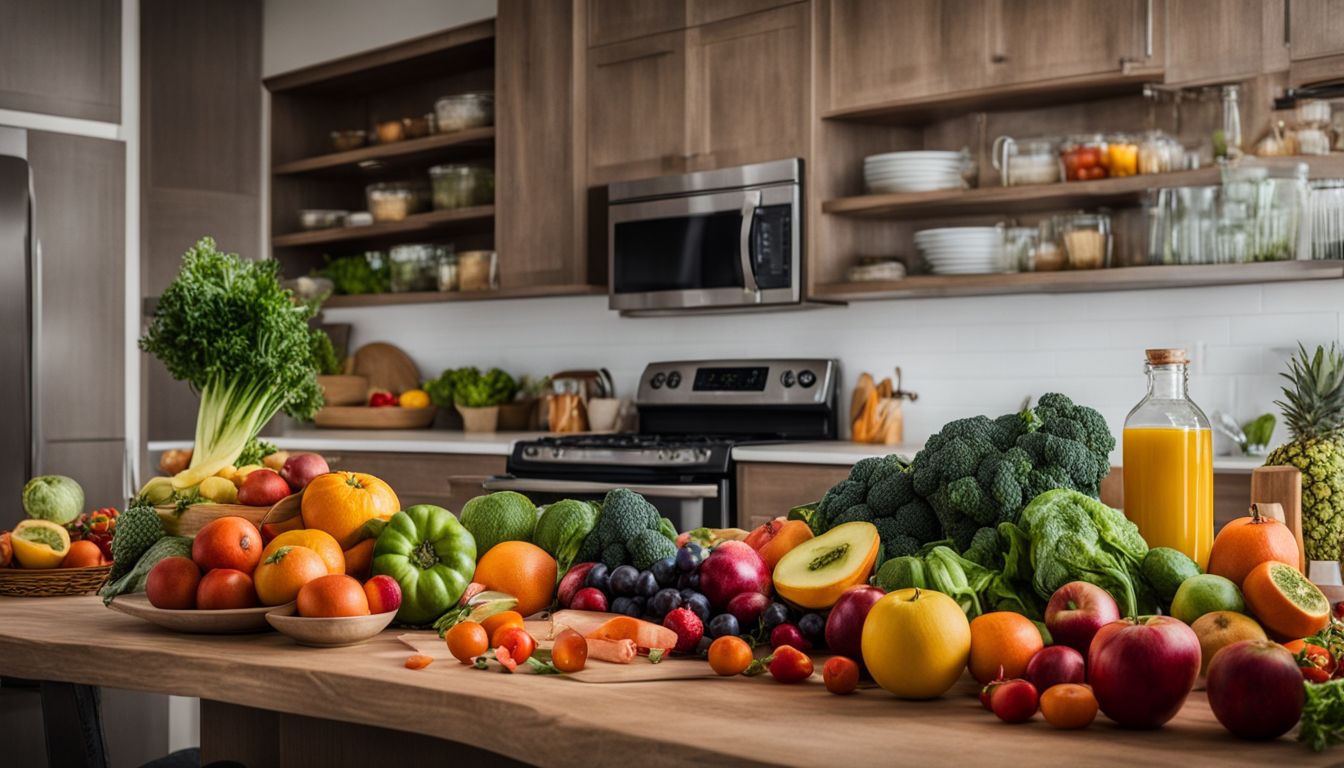
High protein low calorie foods serve a crucial role in maintaining overall health. The power of lean proteins isn’t to be underestimated, as they are the building blocks for our muscles and cells, fostering growth and repair.
Foods such as black beans, an inexpensive source of protein or chicken breast where approximately 73% of its calories come from protein, help fuel these processes without pulling in unnecessary calories.
Foods that are both high in protein and low in calories also become advantageous when it comes to weight management. As opposed to empty-calorie foods which may leave you feeling hungry quite soon after consumption, high-protein options keep you satiated for longer.
Their lower calorie content means less energy is stored within the body as fat. Choices like egg whites—with 85% of their calories coming from protein—are perfect examples that satisfy hunger without leading to excessive energy intake or weight gain.
The Top 40 High Protein Low Calorie Foods (with portion sizes and calorie counts)
1. Chicken Breast: Lean and protein-packed, it’s a staple for low-calorie, high-protein diets.

Chicken Breast is a powerhouse of protein and plays an integral part in any high-protein diet. As one of the leanest meats, it provides your body with essential nutrients without adding unnecessary calories.
A single serving can supply almost half of the daily recommended protein intake, making it ideal for those on a weight-loss regimen or who are looking to build muscle.
Full of vitamins like B6 and niacin, chicken breast helps boost metabolism and supports cardiovascular health. Its versatility allows you to incorporate it into salads, sandwiches, stir-fries or enjoy it grilled for a satisfying main course.
Not only will you be fueling your body with nutrient-dense food but also enjoying each savory bite!
| – Weight: 100g (3.5oz) |
| – Calories: 165 kcal |
| – Protein: 31g |
2. Turkey: Another lean meat option with high protein content.
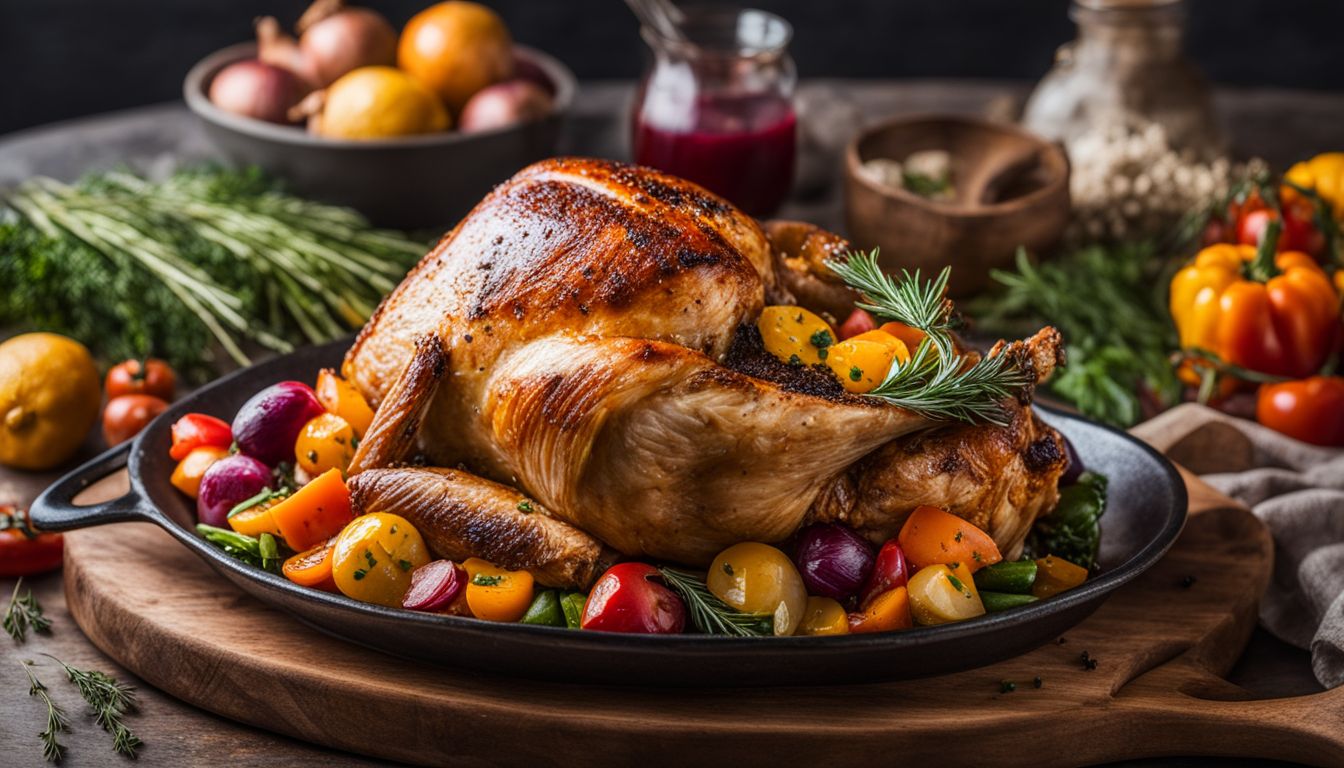
Turkey is significantly rich in protein, making it an excellent choice for a high-protein diet. This lean meat provides essential nutrients necessary for optimal health, including B vitamins and selenium.
The low-fat content in turkey makes it ideal for those looking to maintain or decrease their body weight while getting their required protein intake.
In addition to its plentiful protein supply, turkey has some other dietary advantages as well. It’s lower in calories compared to many other animal-based proteins. Furthermore, turkey is versatile and can be prepared in various delicious ways without adding excessive fats or oils.
Whether grilled, roasted, or even used as a ground meat substitute in recipes – the options are plenty when incorporating this lean protein source into meals.
| – Weight: 100g (3.5oz) |
| – Calories: 135 kcal |
| – Protein: 29g |
3. Egg Whites: A low-calorie source of pure protein.

Egg whites are highly preferred by individuals aiming to consume high protein while keeping caloric intake low. They essentially consist of pure protein, making them an excellent source for anyone needing a quick and convenient way to boost daily protein consumption.
Around 67% of the total protein found in eggs comes from the egg white alone.
The presence of all essential amino acids makes these egg whites even more valuable for those looking to maintain or build muscle mass. Every large egg white gives you about 3.6 grams of protein with just 17 calories which is nearly fat-free.
This can be compared favoribly with other foods that often carry higher calorie counts or less desirable types of fats.
Despite its lower nutrients density compared to whole eggs, having no cholesterol and being low in saturated fat gives egg whites their own unique health benefits apart from offering pure proteins.
The good news is that they are pretty accessible and extremely versatile ingredient-wise — easy enough for people at any cooking skill level to incorporate into meals.
| – Weight: 100g (3.5oz) |
| – Calories: 52 kcal |
| – Protein: 11g |
4. Greek Yogurt: Packed with protein and lower in calories compared to some other dairy options.

Greek yogurt offers a lot more than its tangy taste. It’s a dairy powerhouse, packed with almost twice the protein of regular yogurt while being lower in calories. Known to be satisfyingly filling, it is an ideal choice for those trying to manage their weight.
The richness of Greek yogurt comes from its thick texture and high protein content, which contributes to longer satiety levels. This could potentially lead to lower calorie intake overall – making it a fantastic option for anyone pursuing weight-loss or muscle building goals.
Additionally, Greek Yogurt is also rich in calcium and probiotics that promote gut health.
For flavor variety and added nutritional benefits consider topping your bowl of Greek Yogurt with fruits like bananas or berries; another delicious way to enhance this already nutrient-packed food source.
| – Weight: 150g (5.3oz) |
| – Calories: 100 kcal |
| – Protein: 15g |
5. Cottage Cheese: A dairy choice rich in protein and relatively low in calories.
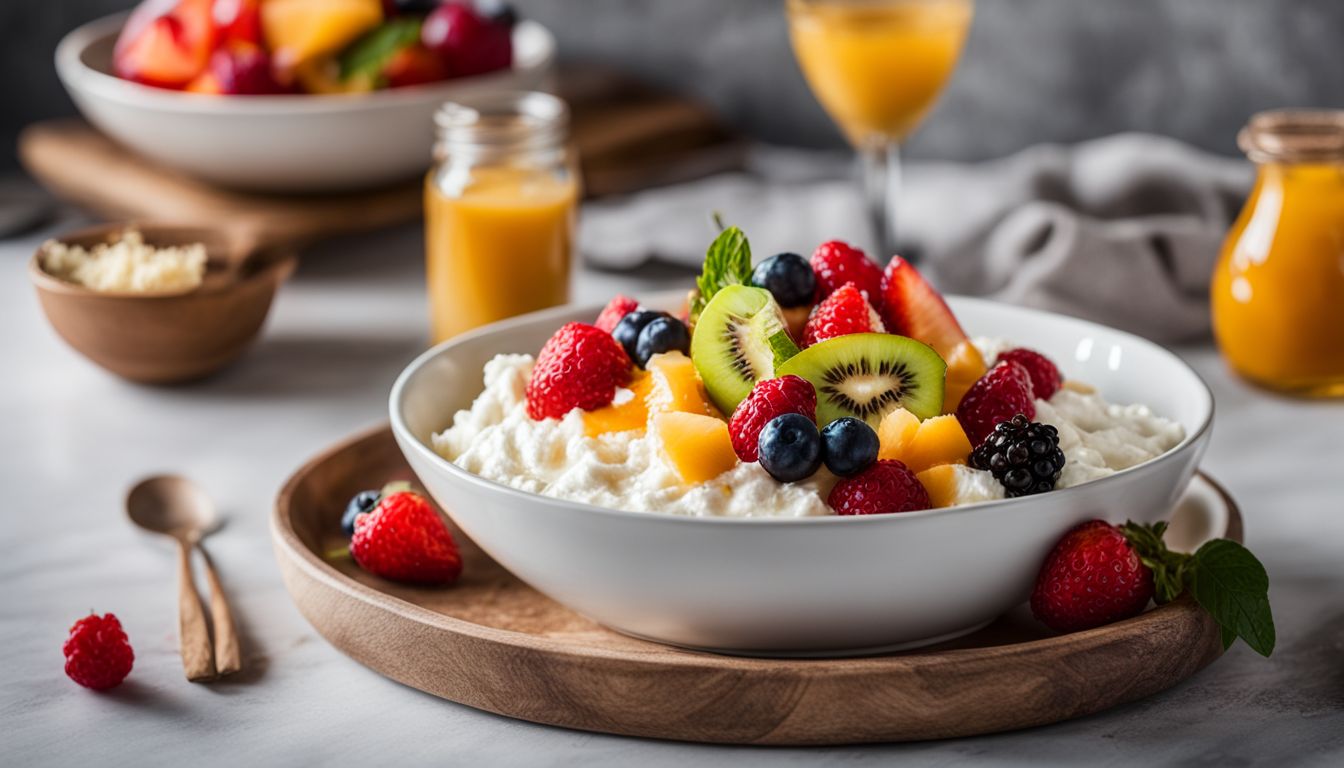
Cottage cheese is a dairy option that is not only delicious but also packed with protein and low in calories. With its creamy texture and tangy flavor, cottage cheese makes for a satisfying snack or addition to meals.
Just one cup of cottage cheese contains approximately 28 grams of protein, making it an excellent source of this essential nutrient. Protein is important for muscle repair and growth, as well as keeping you feeling full and satisfied.
Additionally, cottage cheese is relatively low in calories compared to other dairy options, making it a great choice for those looking to manage their calorie intake while still getting a protein boost.
So next time you’re looking for a nutritious and filling snack, reach for some cottage cheese!
| – Weight: 100g (3.5oz) |
| – Calories: 98 kcal |
| – Protein: 11g |
6. Salmon: A fatty fish that’s high in protein and heart-healthy omega-3 fatty acids.
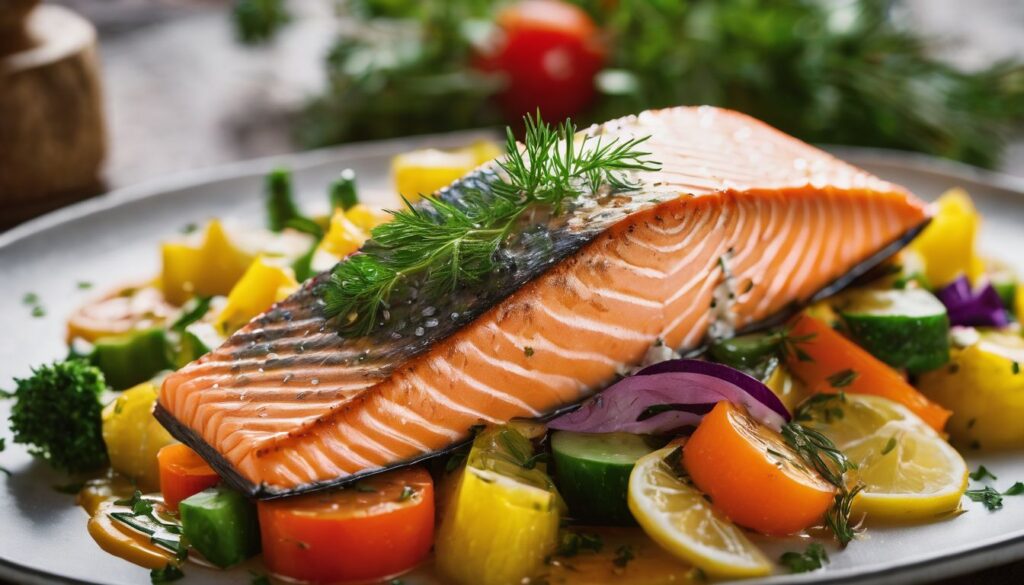
Salmon is a protein-packed food that offers numerous health benefits. Not only is it high in protein, but it also contains heart-healthy omega-3 fatty acids. These Omega-3s are essential for brain function and have been shown to reduce inflammation in the body.
Additionally, salmon can help lower blood pressure and reduce the risk of heart disease. It’s not just a great source of lean protein; it’s also a tasty addition to any diet.
In fact, one 4-ounce serving of salmon contains around 22 grams of protein and provides all nine essential amino acids that our bodies need. This makes it an excellent choice for people looking to build muscle or maintain a healthy weight.
The omega-3 fatty acids found in salmon offer additional benefits like improving cognitive function and reducing joint pain.
So whether you’re following a high-protein diet or looking to incorporate more nutrient-dense foods into your meals, adding salmon to your menu will provide both the protein and healthy fats your body needs to thrive.
| – Weight: 100g (3.5oz) |
| – Calories: 206 kcal |
| – Protein: 22g |
7. Tuna: A low-calorie seafood option with a significant protein punch.

Tuna is a fantastic choice for anyone looking to increase their protein intake without consuming too many calories. This low-calorie seafood option packs a significant protein punch, making it an excellent addition to any diet.
Tuna contains about 30 grams of protein per 3-ounce serving, which is impressive considering its calorie content. Protein is essential for building and repairing tissues in the body, as well as supporting muscle growth and overall health.
With tuna, you can enjoy a nutritious meal that satisfies your hunger while contributing to your daily protein goals.
| – Weight: 100g (3.5oz) |
| – Calories: 116 kcal |
| – Protein: 25g |
8. Shrimp: Low in calories and high in protein, shrimp is a great seafood choice.

Shrimp is a fantastic seafood option that offers both low calorie and high protein content. With just a handful of calories, shrimp provides a significant amount of protein to support your dietary needs.
This makes it an ideal choice for those who are looking to maintain or build muscle while keeping their calorie intake in check. Additionally, shrimp is not only delicious but also rich in nutrients like selenium and vitamin B12, which are essential for optimal health.
So whether you’re grilling it, sautéing it, or adding it to stir-fries and salads, shrimp can be a tasty and nutritious addition to your meals.
| – Weight: 100g (3.5oz) |
| – Calories: 99 kcal |
| – Protein: 24g |
9. Lentils: A plant-based protein source that’s also high in fiber.
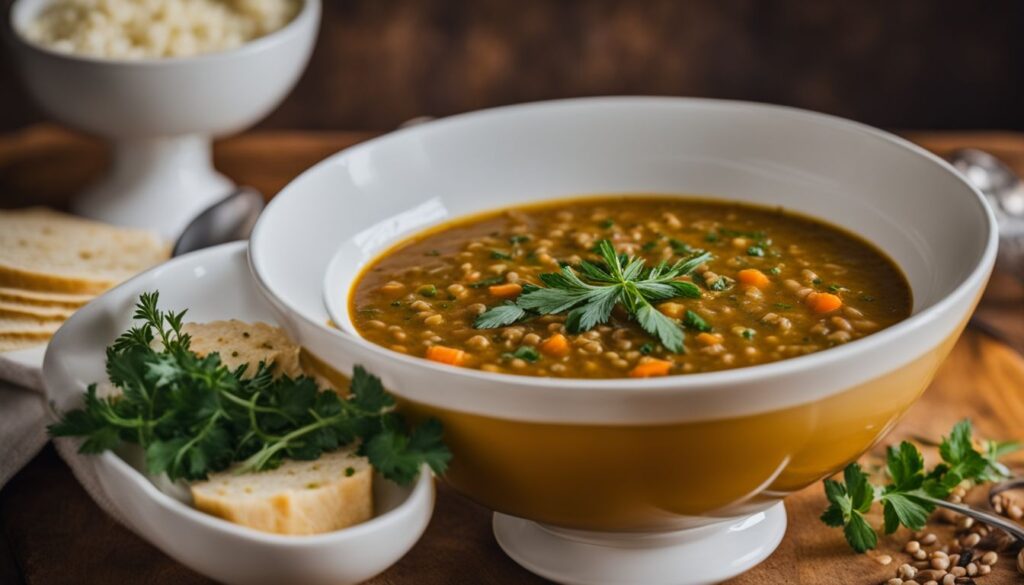
Lentils are an excellent plant-based protein source that is also high in fiber. They are a versatile legume that can be used in various dishes such as soups, stews, salads, and side dishes.
With around 18 grams of protein per cooked cup, lentils are a great option for those looking to increase their protein intake.
In addition to being a good source of protein, lentils are also packed with dietary fiber. This combination of protein and fiber makes lentils a satisfying food choice that can help keep you fuller for longer.
The fiber content in lentils not only aids in digestion but also supports heart health by helping lower cholesterol levels.
Including lentils in your diet provides many other health benefits as well. They are rich in essential nutrients like iron, potassium, and folate. Lentils also contain antioxidants that help fight inflammation and protect against chronic diseases.
Overall, lentils offer a nutritious alternative to animal-based proteins for vegetarians or anyone looking to incorporate more plant-based foods into their diet. So go ahead and get creative with lentil recipes – your taste buds and your body will thank you!
| – Weight: 100g (3.5oz) |
| – Calories: 116 kcal |
| – Protein: 9g |
10. Black Beans: A versatile legume that provides protein and fiber.
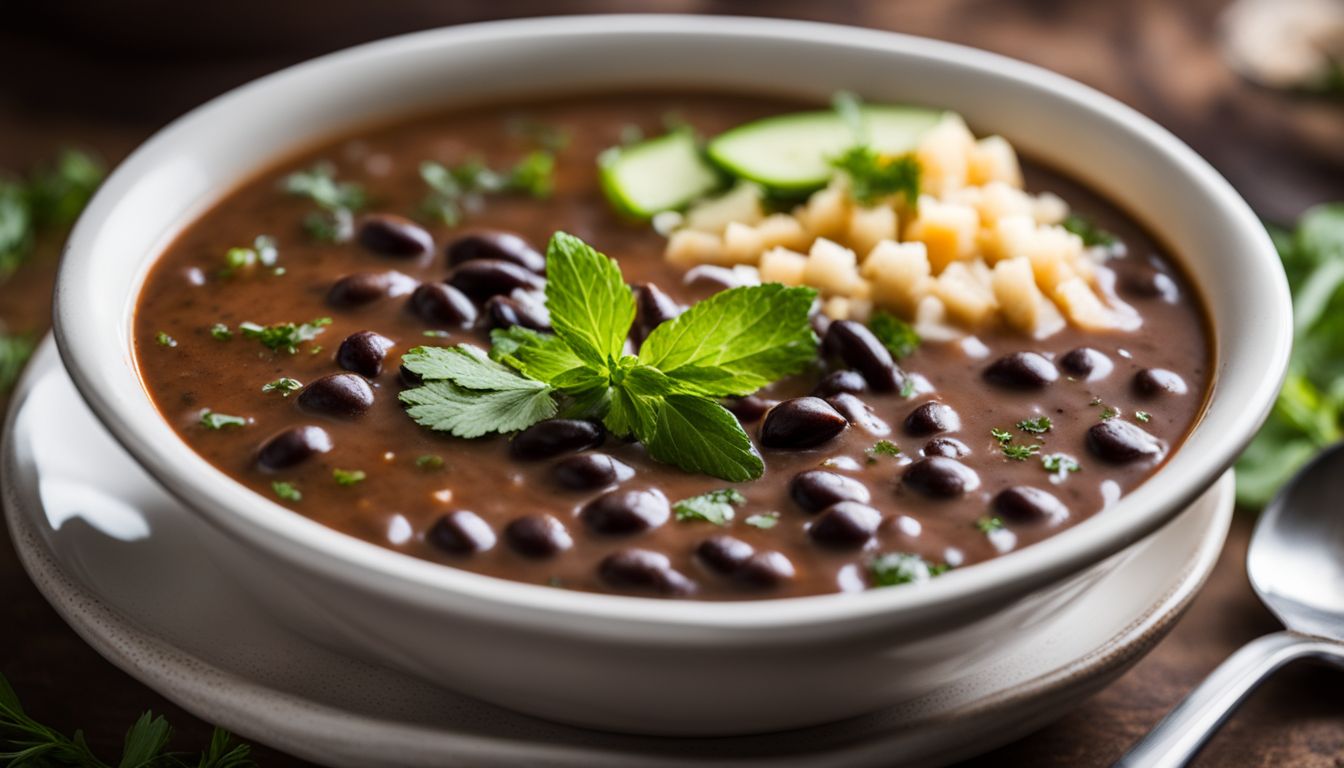
Black beans are not only delicious but also a great source of protein and fiber. These versatile legumes can be used in a variety of dishes, from soups and stews to salads and burritos.
Just half a cup of cooked black beans provides around 8 grams of protein, making it an excellent choice for vegetarians or those looking to reduce their meat consumption. In addition to protein, black beans are packed with dietary fiber, which can help promote healthy digestion and keep you feeling fuller for longer.
Incorporating black beans into your diet is an easy way to boost your protein intake while also benefiting from the many other nutrients they offer.
| – Weight: 100g (3.5oz) |
| – Calories: 132 kcal |
| – Protein: 8g |
11. Edamame: Young soybeans that are rich in protein and low in calories.
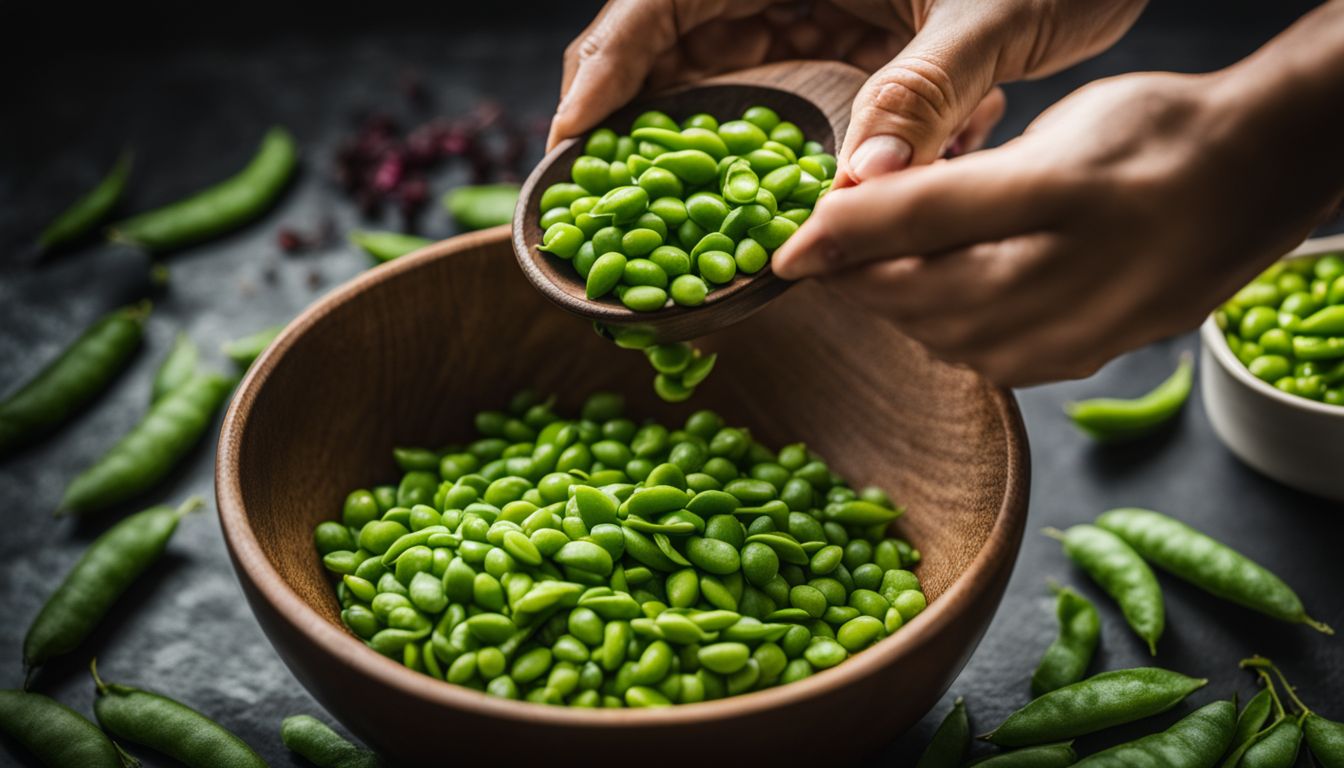
Edamame is a fantastic protein source that also happens to be low in calories. These are young soybeans that pack a punch when it comes to nutrition. Edamame offers around 8 grams of protein per half cup serving, making it an excellent plant-based option for those looking to increase their protein intake.
Additionally, edamame is packed with essential amino acids and provides vital nutrients like folate and vitamin K. Incorporating edamame into your diet can help support muscle growth and repair, making it an ideal choice for athletes or anyone looking to build lean muscle mass.
Plus, its low-calorie content makes it a great snack for weight management. So grab a handful of these tasty beans and enjoy the benefits they bring to your health!
| – Weight: 100g (3.5oz) |
| – Calories: 122 kcal |
| – Protein: 11g |
12. Chickpeas: Packed with protein and a good source of dietary fiber.

Chickpeas are a protein-rich food that can be enjoyed in various dishes. With approximately 15 grams of protein per cup, they make an excellent choice for those looking to increase their protein intake.
Not only are chickpeas packed with protein, but they also provide a good source of dietary fiber. Fiber is essential for maintaining a healthy digestive system and promoting feelings of fullness, which can aid in weight management.
Adding chickpeas to salads, soups, or even making homemade hummus can be a delicious way to incorporate this nutritious legume into your diet.
In addition to being high in protein and fiber, chickpeas offer several other health benefits. They are low in fat and cholesterol-free, making them heart-healthy options. Chickpeas also contain important vitamins and minerals like iron, folate, magnesium, and zinc.
These nutrients play crucial roles in supporting energy production, red blood cell formation, immune function, and overall well-being.
Adding chickpeas to your meals not only boosts the nutritional value but also provides versatility in cooking. From crispy roasted chickpea snacks to creamy curries or nourishing grain bowls – the possibilities are endless when it comes to incorporating these protein-packed legumes into your diet!
| – Weight: 100g (3.5oz) |
| – Calories: 164 kcal |
| – Protein: 8g |
13. Tofu: A plant-based protein option with relatively low calories.
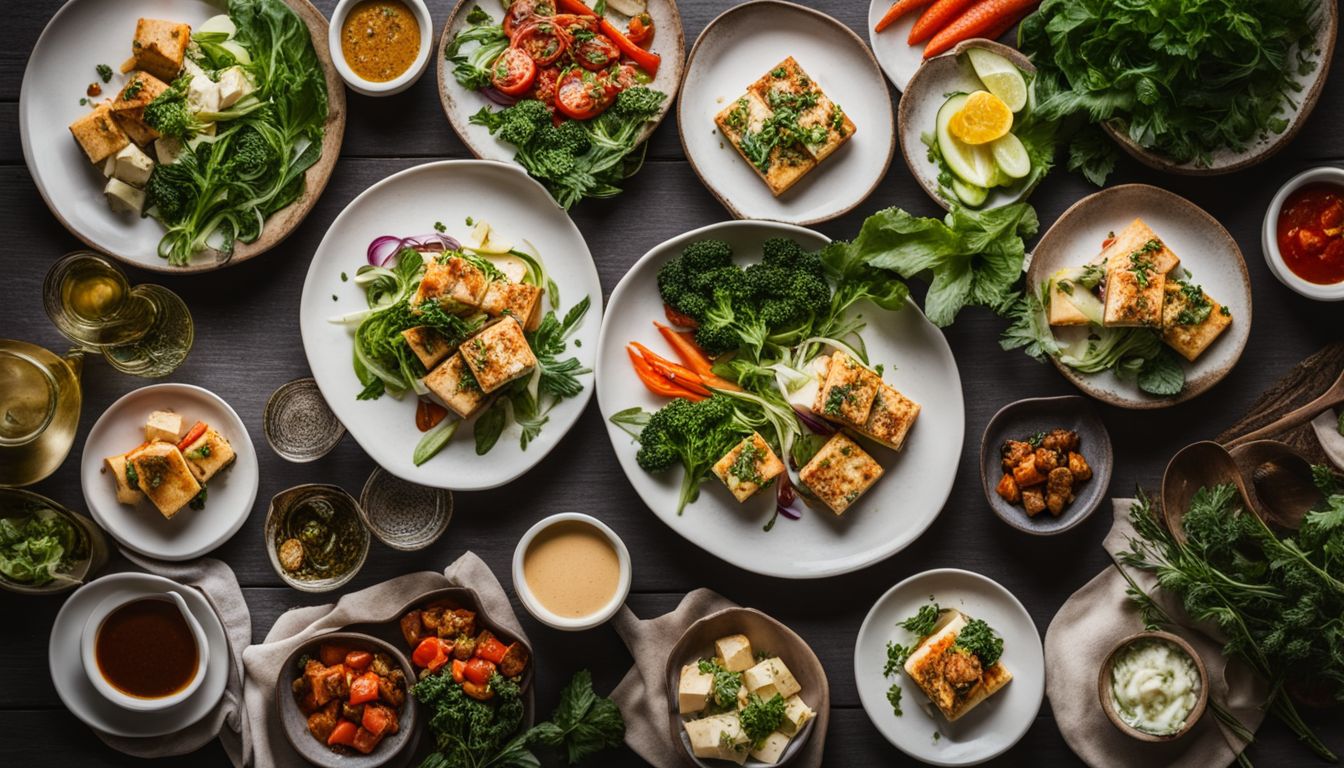
Tofu is a versatile and popular plant-based protein option that offers a relatively low-calorie content. Made from soybeans, tofu is rich in essential amino acids and provides about 8 grams of protein per 3-ounce serving.
It’s also low in saturated fat and contains no cholesterol, making it an excellent choice for those seeking to reduce their intake of animal-based proteins. Tofu can be cooked in various ways, absorbing flavors from marinades or spices, making it a great addition to stir-fries, salads, soups, and even desserts.
Incorporating tofu into your diet can help increase your protein intake while maintaining a balanced caloric intake.
| – Weight: 100g (3.5oz) |
| – Calories: 144 kcal |
| – Protein: 15g |
14. Quinoa: A grain that is a complete protein source and rich in nutrients.
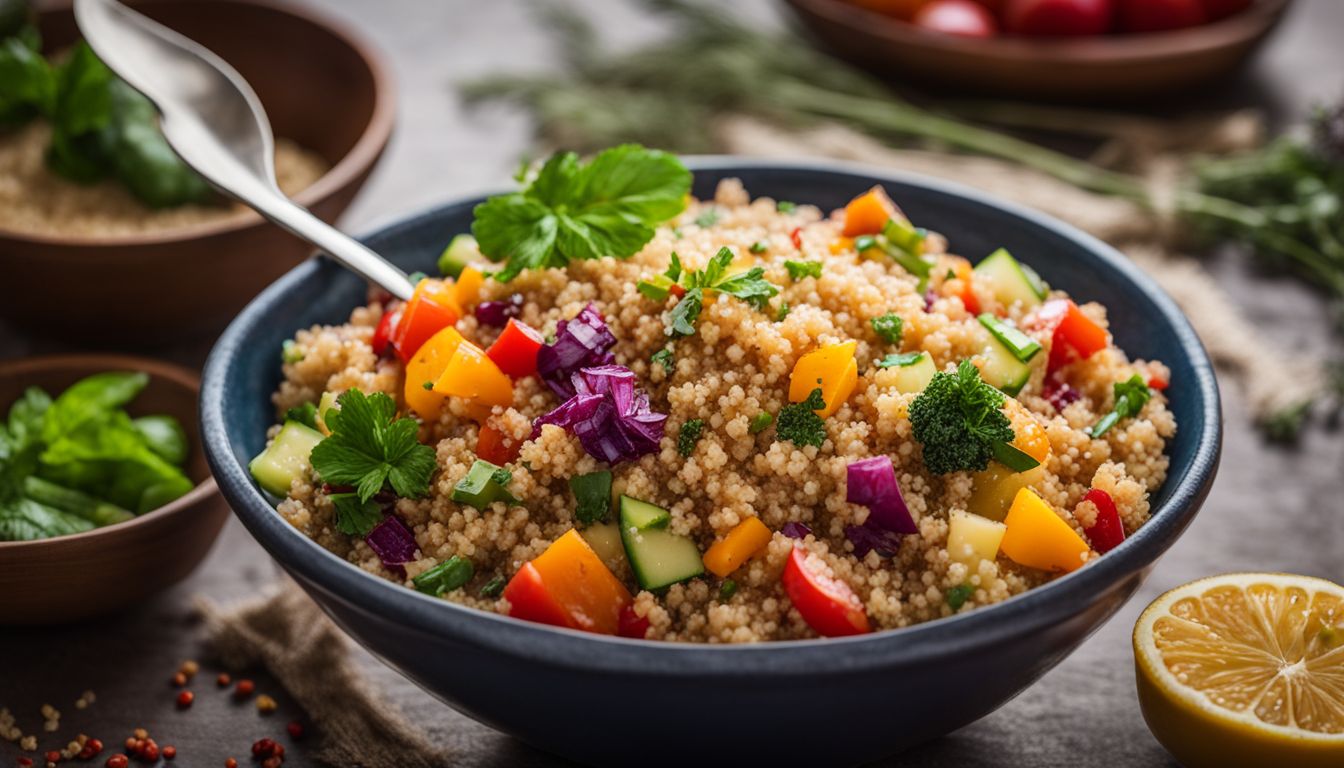
Quinoa is a versatile grain that is not only delicious but also highly nutritious. It is considered a complete protein source, meaning it contains all the essential amino acids our bodies need.
In addition to its protein content, quinoa is rich in vitamins, minerals, and dietary fiber. This superfood provides important nutrients like magnesium, iron, and zinc. Incorporating quinoa into your diet can help support muscle growth and repair while providing long-lasting energy throughout the day.
Whether you use it as a base for salads or as a substitute for rice in stir-fries, quinoa is an excellent choice for those looking to increase their protein intake while enjoying a nutrient-packed meal.
| – Weight: 185g (1 cup, cooked) |
| – Calories: 222 kcal |
| – Protein: 8g |
15. Lean Beef: Choose lean cuts for a protein boost with fewer calories.

Lean beef is an excellent source of protein, making it a great choice for those looking to increase their protein intake. Choosing lean cuts of beef can provide a protein boost without adding excessive calories to your diet.
Lean cuts of beef, such as sirloin or tenderloin, are lower in fat compared to fattier cuts like ribeye or T-bone steak.
Protein is essential for building and repairing muscle tissue, as well as supporting overall health. It also helps with satiety and weight management by keeping you feeling fuller for longer.
Lean beef not only provides high-quality protein but also contains important nutrients like iron and vitamin B12.
To incorporate lean beef into your meals, try grilling a steak or adding slices of roast beef to salads and sandwiches. Remember to choose lean cuts and moderate portion sizes for optimal health benefits.
By including lean beef in your diet, you can enjoy a delicious protein-packed meal while maintaining a balanced approach to nutrition.
| – Weight: 100g (3.5oz) |
| – Calories: 250 kcal |
| – Protein: 26g |
16. Low-Fat Mozzarella Cheese: A dairy option that’s lower in fat and calories but still protein-rich.
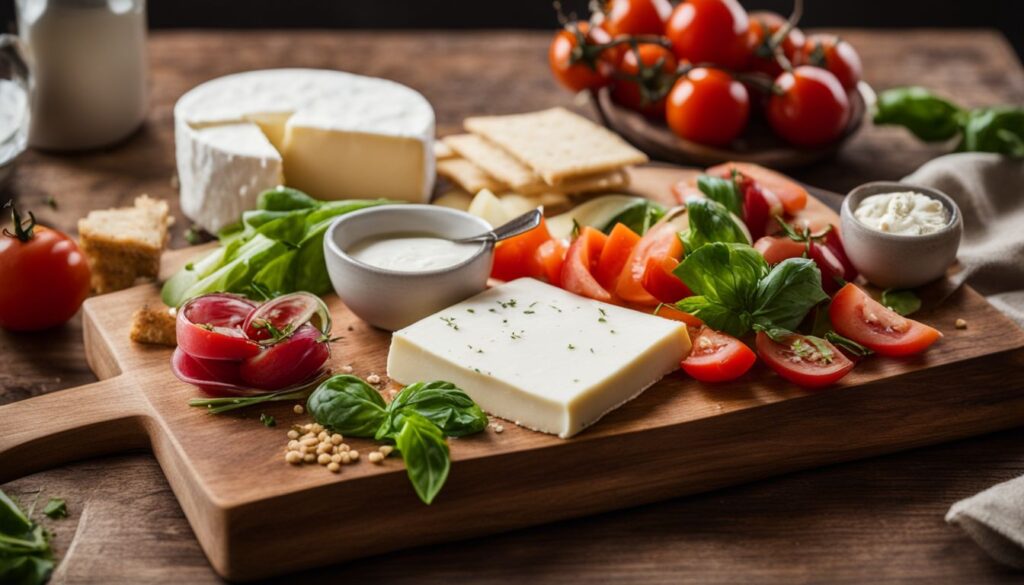
Low-Fat Mozzarella Cheese is a great option for those seeking a lower-fat and lower-calorie dairy alternative without sacrificing protein. While regular mozzarella cheese can be higher in fat, the low-fat version provides a good amount of protein while cutting back on the calories.
Protein is essential for building and repairing body tissues, as well as supporting muscle growth and development. Incorporating low-fat mozzarella cheese into your diet can help meet your protein needs while managing your overall calorie intake.
The key to enjoying low-fat mozzarella cheese is portion control. Be mindful of serving sizes to avoid consuming excessive amounts of calories. Low-fat mozzarella cheese can be enjoyed in various ways – melted over whole grain toast or added to salads, sandwiches, or homemade pizzas.
Its mild flavor pairs well with a variety of ingredients, making it a versatile choice for adding protein to your meals. So go ahead and indulge in this delicious option that offers both taste and nutrition!
| – Weight: 28g (1oz) |
| – Calories: 72 kcal |
| – Protein: 8g |
17. Cauliflower Rice: A low-calorie alternative to traditional rice with a bit of protein.
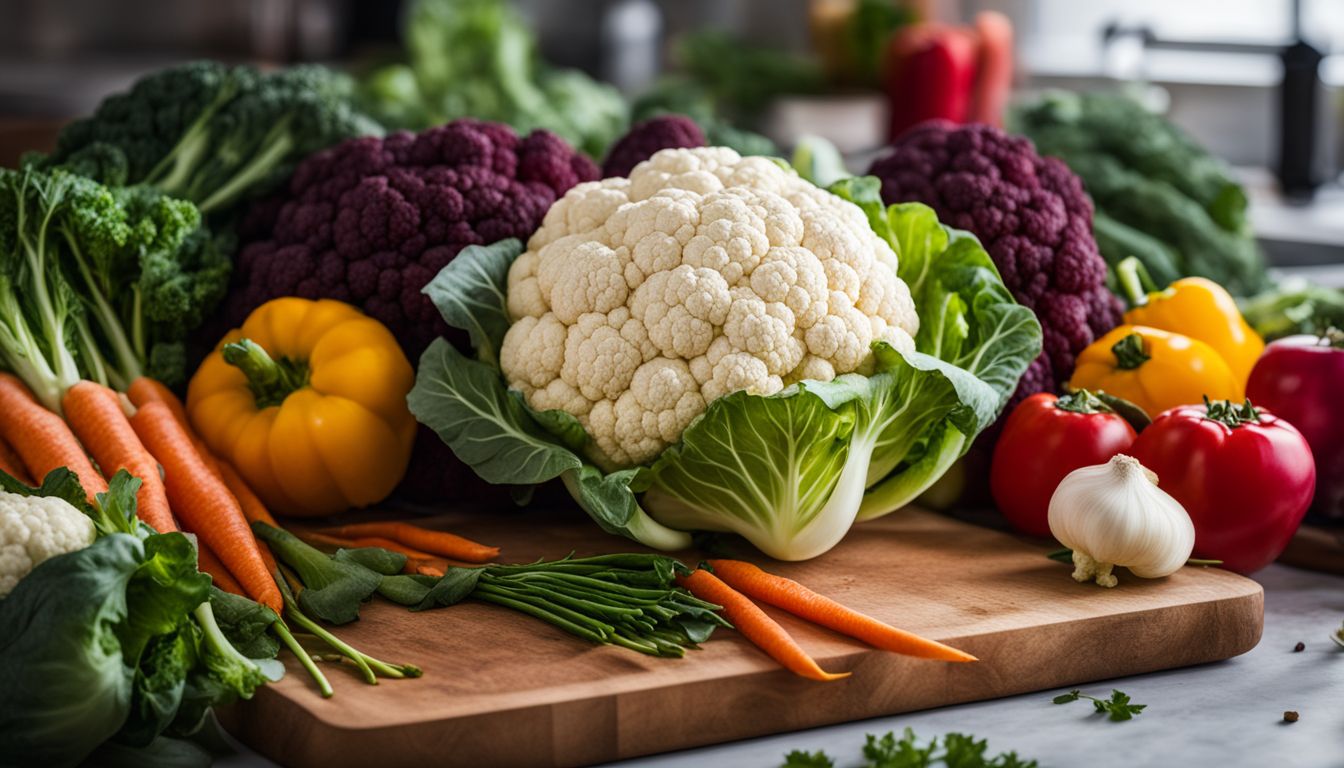
Cauliflower rice is a fantastic low-calorie alternative to traditional rice that also offers a bit of protein. Made from grated or processed cauliflower, it can be used in place of rice in various dishes like stir-fries, grain bowls, and even sushi rolls.
With only about 25 calories per cup compared to around 200 calories in the same amount of cooked white rice, cauliflower rice is an excellent choice for those looking to reduce their calorie intake while still enjoying a satisfying meal.
Additionally, cauliflower provides some protein along with other essential nutrients like vitamin C and fiber. It’s a versatile and nutritious option for anyone seeking a lighter carbohydrate alternative that won’t compromise on flavor or texture.
| – Weight: 100g (3.5oz) |
| – Calories: 25 kcal |
| – Protein: 2g |
18. Broccoli: A vegetable with a decent protein content and very low in calories.

Broccoli is not only a versatile and nutritious vegetable, but it also contains a surprising amount of protein. With its vibrant green florets and crunchy stems, broccoli offers a decent protein content that can be beneficial for those looking to increase their intake without packing on extra calories.
In addition to being protein-rich, broccoli is incredibly low in calories, making it an excellent choice for weight management or anyone watching their calorie intake. So whether you enjoy it steamed, roasted, or added to stir-fries and salads, adding some broccoli to your plate can contribute to a well-rounded and nutritious meal.
Protein is an essential nutrient for the body as it plays a vital role in building and repairing tissues. While many people turn to animal sources like meat and dairy products for their protein needs, incorporating plant-based options like broccoli can diversify your diet while still meeting your protein requirements.
Plus, with its high fiber content and other important nutrients like vitamin C and potassium, broccoli offers additional health benefits beyond just its protein content. So next time you’re planning your meals or looking for ways to boost your protein intake without excess calories, don’t forget about this humble yet powerful vegetable – broccoli!
| – Weight: 100g (3.5oz) |
| – Calories: 55 kcal |
| – Protein: 3g |
19. Almonds: A high-protein nut option, but be mindful of portion sizes due to calorie density.

Almonds are a fantastic option when it comes to including protein-rich nuts in your diet. They contain a good amount of protein, making them a great choice for those looking to increase their protein intake.
However, it’s important to be mindful of portion sizes because almonds are calorie-dense. While they offer plenty of nutritional benefits, it’s easy to overconsume and take in too many calories if you’re not careful.
So, enjoy almonds as part of your healthy eating plan but remember to keep an eye on how much you eat to maintain a balanced calorie intake.
| – Weight: 28g (1oz) |
| – Calories: 160 kcal |
| – Protein: 6g |
20. Canned Chicken Breast: A convenient and low-calorie protein source.
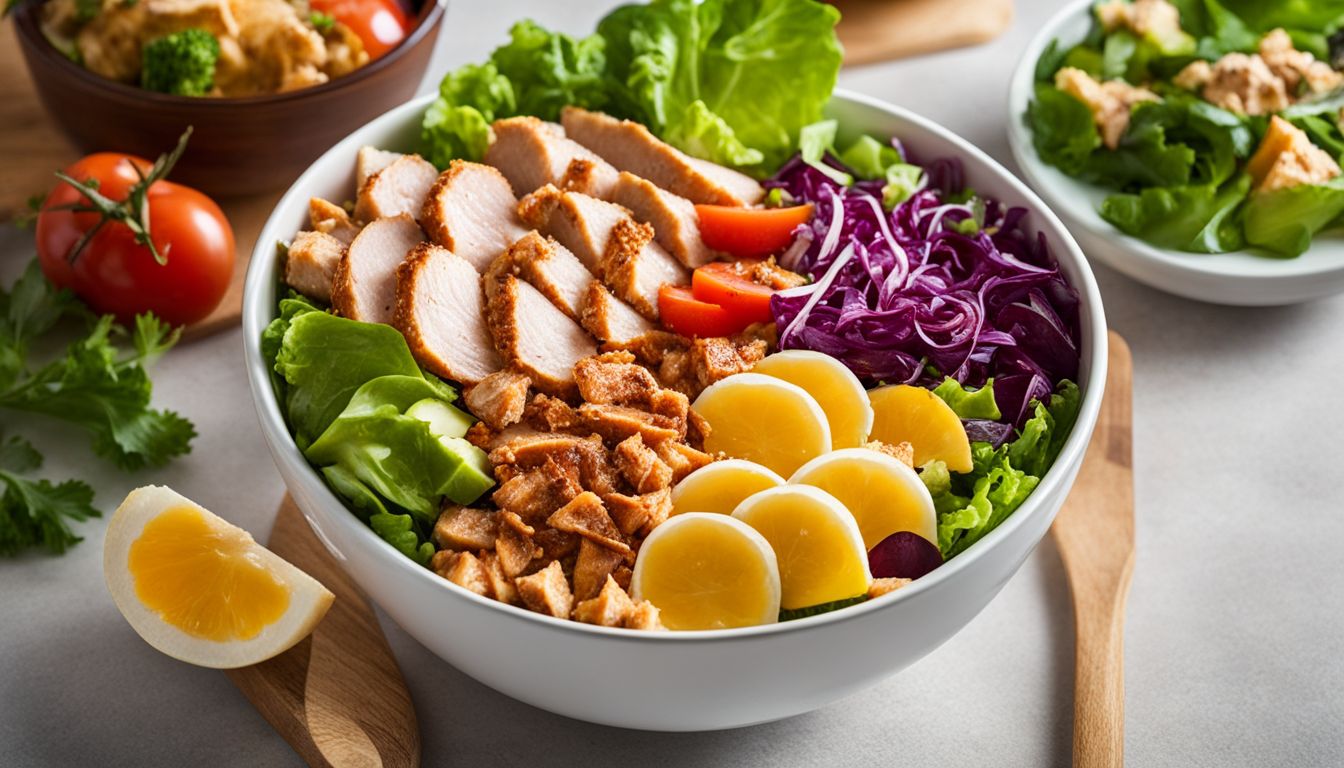
Canned chicken breast is a convenient and low-calorie protein source that can easily be incorporated into your diet. With its long shelf life, it’s a great option to have on hand for quick and easy meals.
Canned chicken breast is not only packed with protein, but it also contains essential amino acids that are necessary for muscle growth and repair. It’s a versatile ingredient that can be used in salads, sandwiches, wraps, or even stirred into soups or casseroles for an added protein boost.
Plus, since it comes canned, you don’t have to worry about cooking raw chicken or dealing with any prep work. Just open the can and enjoy the convenience of this protein-packed option.
| – Weight: 100g (3.5oz) |
| – Calories: 165 kcal |
| – Protein: 32g |
21. Cod: A lean white fish that’s low in calories and high in protein.
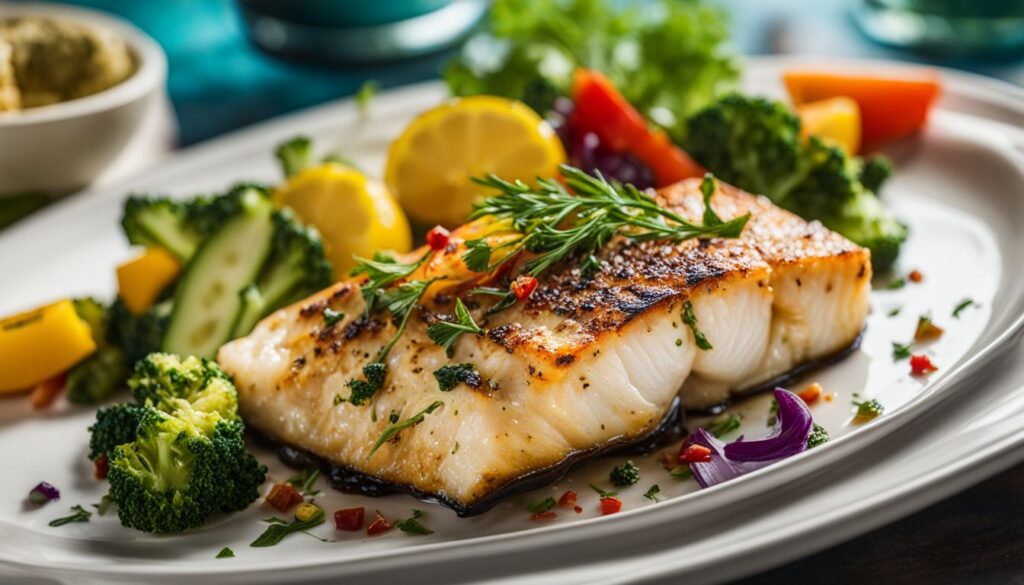
Cod is a fantastic protein source that provides both low calories and high nutritional value. This lean white fish is packed with protein, making it an excellent option for those who want to increase their protein intake while watching their calorie intake.
Not only can cod help in building and repairing muscles, but it also promotes overall health due to its essential nutrients.
In addition to being a great source of protein, cod is also low in fat and contains heart-healthy omega-3 fatty acids. These fatty acids offer various health benefits such as reducing inflammation and supporting brain function.
With its mild flavor and versatile nature, cod can be easily incorporated into a variety of dishes, from grilled or baked fillets to flavorful fish tacos or chowders.
Including cod in your diet can not only boost your protein intake but also provide you with vital nutrients and support your overall well-being. So whether you’re looking to build muscle or simply maintain a healthy lifestyle, adding this lean white fish to your meals will give you the nutrition you need without compromising on taste.
| – Weight: 100g (3.5oz) |
| – Calories: 82 kcal |
| – Protein: 19g |
22. Seitan: A meat substitute made from gluten, providing a high protein content.

Seitan is a fantastic meat substitute that offers a high protein content. It is made from gluten, which is the main protein found in wheat. With its chewy texture and ability to absorb flavors, seitan can be used as a versatile ingredient in various recipes.
Whether you’re looking to reduce your meat consumption or follow a plant-based diet, seitan can be an excellent addition to your meals. Not only does it provide a good amount of protein for muscle building and repair, but it also contains essential amino acids that are necessary for overall health.
Incorporating seitan into your diet can help you meet your protein needs while enjoying delicious and satisfying meals.
| – Weight: 100g (3.5oz) |
| – Calories: 370 kcal |
| – Protein: 75g |
23. Skim Milk: A lower-calorie dairy option with a good amount of protein.

Skim milk is a great choice for those looking to lower their calorie intake while still getting a good amount of protein. It is a dairy option that has had the fat removed, resulting in fewer calories compared to whole milk.
Despite being lower in fat, skim milk still contains an impressive amount of protein. Protein is an essential nutrient that helps support muscle growth and repair, making it especially important for those who are physically active or looking to build lean muscle mass.
Additionally, skim milk provides various vitamins and minerals like calcium, vitamin D, and potassium, which are vital for overall health. So if you’re watching your calories but still want a good source of protein and other important nutrients, skim milk is definitely worth considering.
| – Weight: 240ml (1 cup) |
| – Calories: 83 kcal |
| – Protein: 8g |
24. Pork Tenderloin: A lean cut of pork that’s rich in protein.
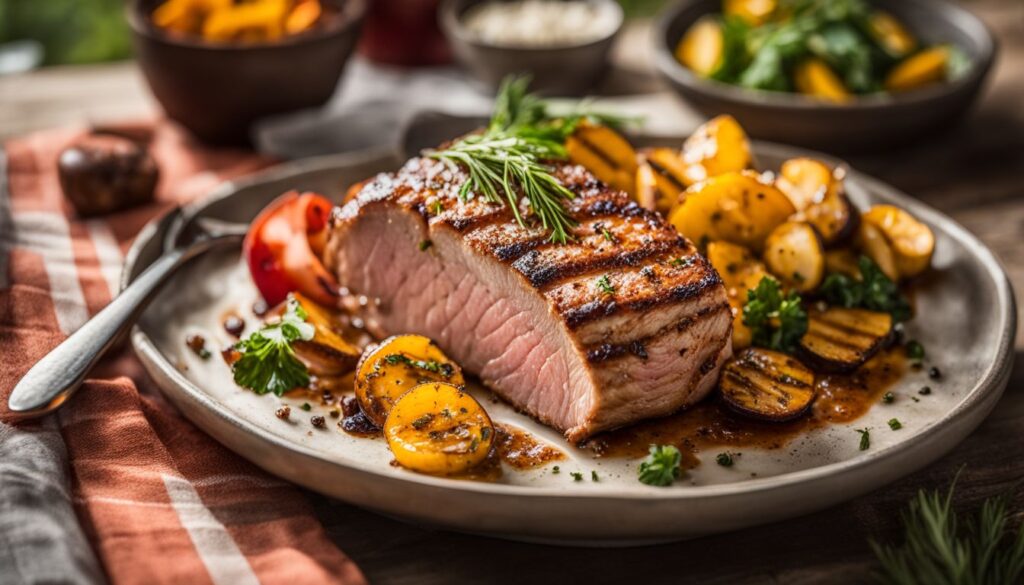
Pork tenderloin is a lean cut of pork that packs a punch when it comes to protein. It’s an excellent choice for those looking to increase their protein intake without consuming excess calories.
In addition to being rich in protein, pork tenderloin also provides essential nutrients like vitamins B6 and B12, as well as zinc and selenium. These nutrients play important roles in supporting overall health and maintaining proper bodily functions.
Including pork tenderloin in your diet can have several benefits. Protein is essential for muscle growth and repair, making it particularly beneficial for individuals who engage in regular physical activity or are looking to build lean muscle mass.
It also helps keep you feeling full and satisfied, which can aid in weight management by reducing cravings and preventing overeating.
To enjoy the benefits of pork tenderloin, try grilling or roasting it with some flavorful herbs and spices. Pair it with nutritious sides like steamed vegetables or whole grains for a complete meal that’s not only delicious but also packed with protein.
| – Weight: 100g (3.5oz) |
| – Calories: 143 kcal |
| – Protein: 22g |
25. Halibut: A lean fish with a high protein content.
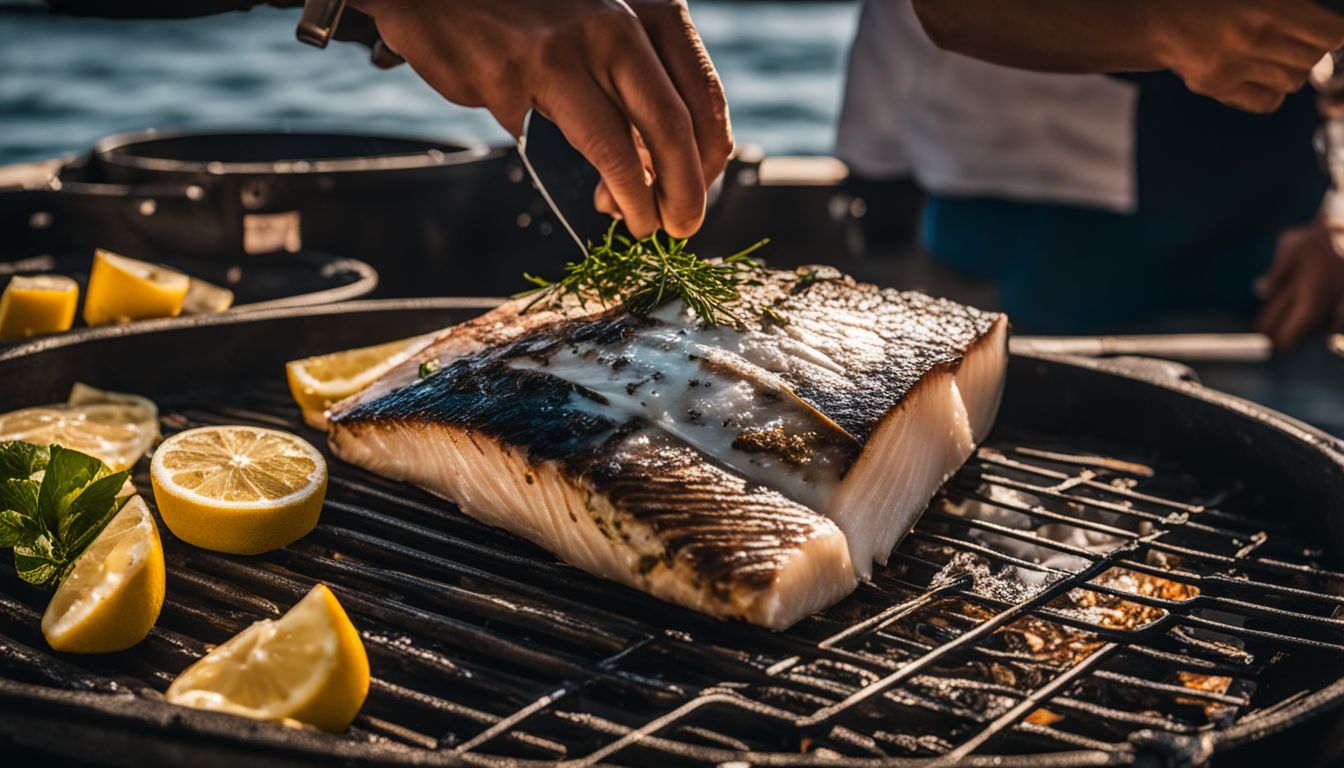
Halibut is a lean fish that not only tastes delicious but also provides a high level of protein. With its mild, delicate flavor and firm texture, halibut is a popular choice for seafood lovers looking to add more protein to their diet.
Protein is an essential nutrient that plays a crucial role in building and repairing body tissues, as well as supporting immune function and energy production. Halibut offers an impressive amount of protein while remaining low in calories and fat.
Adding halibut to your meals can help you meet your protein needs while enjoying a nutritious and satisfying meal option.
| – Weight: 100g (3.5oz) |
| – Calories: 111 kcal |
| – Protein: 23g |
26. Brussels Sprouts: A vegetable with moderate protein content and low calories.

Brussels sprouts are a vegetable that offers not only great taste but also moderate protein content and low calories. These green gems are packed with nutrients and can be a healthy addition to any meal.
Brussels sprouts provide about 3 grams of protein per cup, making them a good plant-based source of this essential nutrient. They are also low in calories, with just around 40-50 calories per serving.
In addition to their protein content, Brussels sprouts are rich in fiber, vitamins C and K, as well as antioxidants. Including these little cabbages in your diet can help support muscle growth and maintenance while keeping your calorie intake in check.
| – Weight: 100g (3.5oz) |
| – Calories: 43 kcal |
| – Protein: 3g |
27. Spinach: A leafy green that offers protein along with a variety of vitamins and minerals.
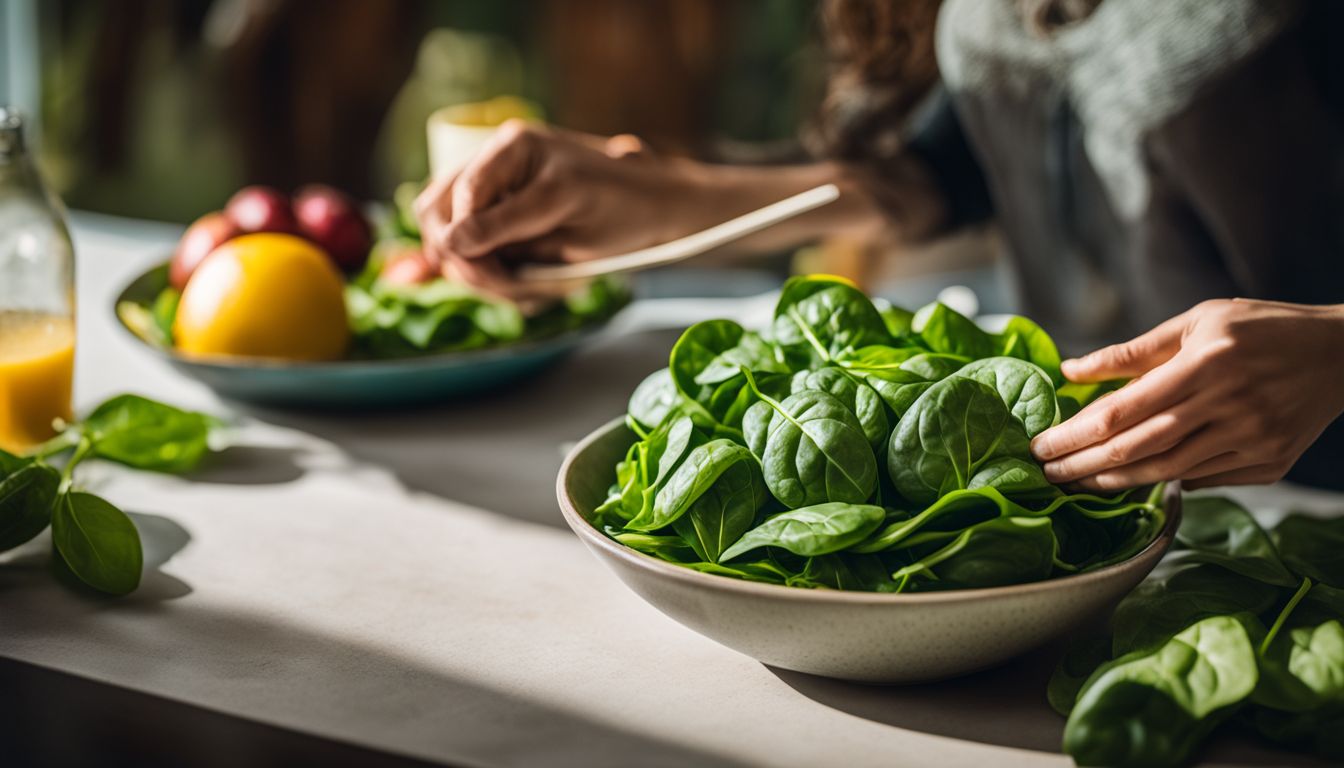
Spinach is not only a leafy green, but it also provides a good amount of protein along with a host of vitamins and minerals. This makes it an excellent choice for those looking to increase their protein intake while enjoying the benefits of nutrient-rich greens.
Spinach is especially high in vitamins A, C, and K, which support eye health, boost immunity, and promote healthy blood clotting. Additionally, spinach contains iron and calcium, essential minerals for strong bones and overall bodily function.
Incorporating spinach into your diet is easy because it can be enjoyed raw in salads or cooked in various dishes like stir-fries or soups. Whether you’re vegetarian or not, adding spinach to your meals can help increase your protein intake while nourishing your body with vital nutrients.
So go ahead and make this versatile leafy green a regular part of your meals for a tasty way to get more protein and other important nutrients into your diet.
| – Weight: 100g (3.5oz) |
| – Calories: 23 kcal |
| – Protein: 2g |
28. Canned Tuna in Water: A low-calorie and high-protein pantry staple.

Canned tuna in water is a convenient and versatile protein source that can be easily incorporated into meals. It is low in calories, making it a great option for those looking to maintain or lose weight.
Each serving of canned tuna provides a significant amount of protein, which is essential for muscle building and repair. Additionally, it is packed with important nutrients such as omega-3 fatty acids, which have been shown to support heart health.
Whether you enjoy it on top of salads, mixed into pasta dishes, or simply as a sandwich filling, canned tuna in water offers a nutritious and satisfying way to boost your protein intake.
| – Weight: 100g (3.5oz) |
| – Calories: 93 kcal |
| – Protein: 20g |
29. Soy Milk (Unsweetened): A plant-based milk alternative with protein and fewer calories.

Soy milk is a great option for those who are looking for a plant-based alternative to dairy milk. It is made from soybeans and provides a good amount of protein while containing fewer calories compared to traditional milk.
Soy milk can be a beneficial addition to a high-protein diet, particularly for individuals who follow vegetarian or vegan lifestyles. It offers all the essential amino acids that our bodies need and is also rich in vitamins and minerals like calcium, vitamin D, and potassium.
Adding unsweetened soy milk to your diet can help increase your protein intake without adding excessive calories, making it suitable for weight management goals as well.
| – Weight: 240ml (1 cup) |
| – Calories: 80 kcal |
| – Protein: 7g |
30. Whey Protein Isolate: A supplement option for a quick protein boost with minimal calories.

Whey protein isolate is a convenient supplement for those looking to increase their protein intake without consuming excessive calories. It is a highly concentrated form of whey protein that has been processed to remove most of the fat and lactose, resulting in a purer protein source.
With minimal calories and almost no carbohydrates or fats, whey protein isolate provides a quick and efficient way to meet your daily protein needs.
In addition to its low calorie content, whey protein isolate offers several other benefits. It is easily digestible and quickly absorbed by the body, making it an ideal choice for post-workout recovery or as a snack between meals.
Whey protein isolate also contains all nine essential amino acids, which are important for muscle growth and repair.
Whether you’re an athlete looking to build muscle or someone who simply wants to maintain a balanced diet, incorporating whey protein isolate into your routine can be beneficial. Just remember that while supplements can be helpful in meeting your nutritional goals, it’s important to prioritize whole foods whenever possible for overall health and well-being.
| – Weight: 30g (1 scoop) |
| – Calories: 110 kcal |
| – Protein: 25g |
31. Turkey Bacon: A leaner alternative to traditional bacon with protein content.

Turkey bacon is a healthier alternative to traditional bacon that still provides a good amount of protein. It is made from turkey meat and has less fat compared to regular bacon, making it a popular choice for those looking to reduce their calorie intake or follow a low-fat diet.
Turkey bacon contains approximately 3 grams of protein per slice, which can contribute to your daily protein needs. It’s important to note that the protein content may vary slightly depending on the brand and preparation method.
So if you’re craving that smoky, savory flavor without all the extra fat, turkey bacon might be just what you need!
| – Weight: 15g (1 slice) |
| – Calories: 35 kcal |
| – Protein: 3g |
32. Venison: A game meat that’s lean and high in protein.
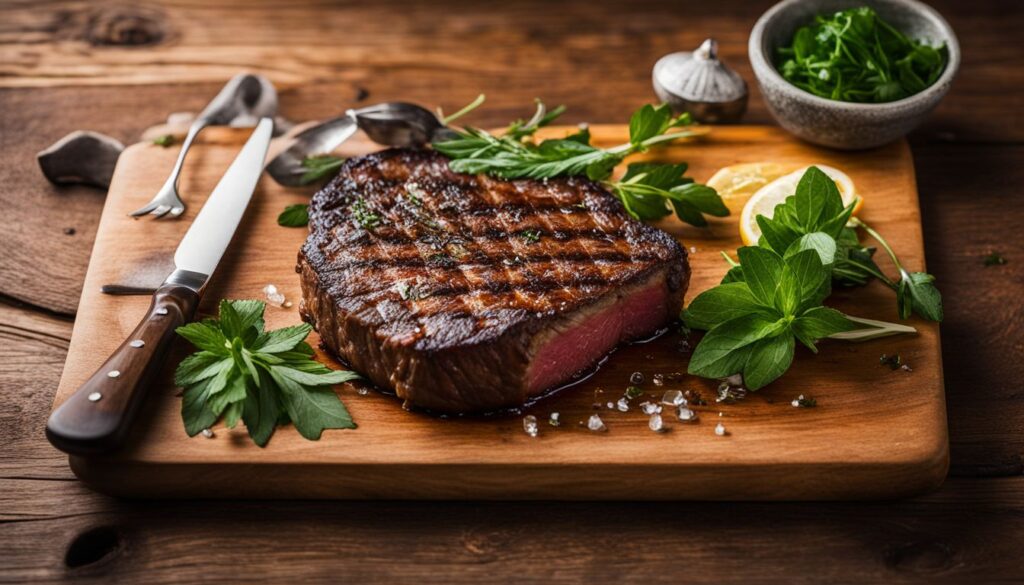
Venison is a game meat that’s packed with protein and known for its leanness. It’s a great choice for those looking to increase their protein intake while keeping their calorie count in check.
With venison, you get all the benefits of animal-based protein without the excess fat. Along with being high in protein, venison also provides essential nutrients that contribute to overall health.
So whether you’re following a high-protein diet or simply looking to add variety to your meals, incorporating venison into your menu can be a nutritious and satisfying option.
| – Weight: 100g (3.5oz) |
| – Calories: 158 kcal |
| – Protein: 30g |
33. Pumpkin Seeds: A protein-rich seed that also provides healthy fats.

Pumpkin seeds are not only delicious but also a great source of protein and healthy fats. These small seeds are packed with nutrients that can benefit your overall health. They contain essential amino acids, which are the building blocks of protein and are important for muscle growth and repair.
In addition to their protein content, pumpkin seeds also provide healthy fats, including omega-3 fatty acids, which have been linked to heart health and brain function.
Including pumpkin seeds in your diet is easy. You can enjoy them as a snack on their own or add them to salads, yogurt, or even smoothies for an extra nutritional boost. Keep in mind that while they are nutritious, pumpkin seeds do contain calories, so it’s important to consume them in moderation as part of a balanced diet.
So next time you’re looking for a convenient and nutrient-dense snack option or want to add some crunch to your meals, consider reaching for pumpkin seeds. With their protein-rich profile and healthy fat content, they make an excellent choice for those seeking a well-rounded food source that supports overall health.
| – Weight: 28g (1oz) |
| – Calories: 151 kcal |
| – Protein: 7g |
34. Non-Fat Greek Yogurt: A version of Greek yogurt with even fewer calories.

Non-Fat Greek Yogurt is a healthier twist on traditional Greek yogurt, offering all the protein benefits with even fewer calories. This tasty and creamy dairy option is packed with high-quality protein that can help keep you feeling satisfied throughout the day.
With its rich and velvety texture, non-fat Greek yogurt makes for a delicious addition to breakfast bowls, smoothies, or as a creamy base for dressings and dips. Whether you’re looking to lose weight or simply increase your protein intake, incorporating non-fat Greek yogurt into your diet is a smart choice.
Including non-fat Greek yogurt in your meals can provide numerous health benefits. Not only does it offer an excellent source of protein, but it also contains essential nutrients like calcium and probiotics that support gut health.
Probiotics are beneficial bacteria that can promote digestion and boost immune function. Additionally, choosing non-fat options reduces calorie intake without sacrificing the nutritious qualities of this versatile food.
So go ahead and enjoy this guilt-free version of Greek yogurt while reaping all the benefits it has to offer!
| – Weight: 150g (5.3oz) |
| – Calories: 100 kcal |
| – Protein: 15g |
35. Cabbage: A cruciferous vegetable that’s low in calories and offers some protein.

Cabbage is a versatile and nutritious vegetable that can be enjoyed in various dishes. It belongs to the cruciferous family, along with broccoli, cauliflower, and kale. One of the benefits of cabbage is its low calorie content, making it a great choice for those looking to manage their weight.
Additionally, cabbage offers some protein, which is essential for building and repairing body tissues. Incorporating cabbage into your meals can provide you with important nutrients while keeping your calorie intake in check.
So whether you enjoy it raw in salads or cooked in stir-fries and soups, cabbage is a tasty addition to any diet.
| – Weight: 100g (3.5oz) |
| – Calories: 25 kcal |
| – Protein: 1g |
36. Lobster: A seafood choice that’s low in calories and high in protein.
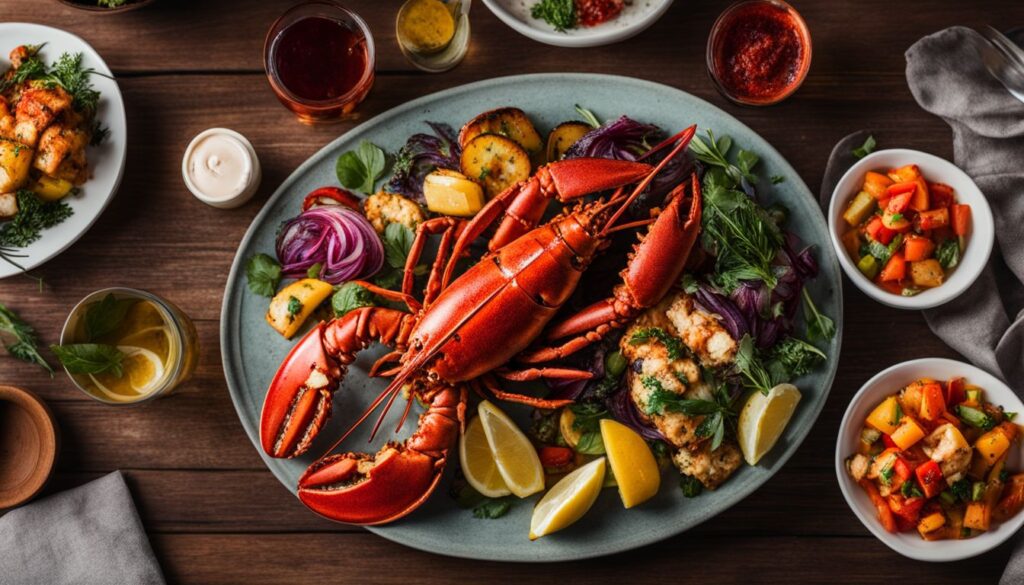
Lobster is a delicious seafood option that not only satisfies your taste buds but also provides a nutritious punch. It’s low in calories and high in protein, making it a great choice for those looking to maintain a healthy diet or lose weight.
With approximately 28 grams of protein per 100 grams, lobster offers a substantial amount of this important macronutrient. Protein is essential for building and repairing tissues, supporting muscle growth, and maintaining overall health.
Additionally, lobster is relatively low in calories compared to other sources of animal protein. This means you can enjoy its rich flavor without worrying about excessive calorie intake.
As part of a balanced diet, incorporating lobster into your meals can help meet your protein needs while keeping your caloric intake in check.
So whether you’re watching your weight or simply want to add more protein to your diet, consider including lobster as one of your seafood choices. Its low-calorie and high-protein content make it an excellent addition to any meal plan focused on maintaining optimal health and nutrition.
| – Weight: 100g (3.5oz) |
| – Calories: 89 kcal |
| – Protein: 19g |
37. Sardines: A small fatty fish that’s protein-packed and rich in omega-3s.

Sardines are small fatty fish that pack a powerful protein punch. Not only are they loaded with protein, but they’re also rich in omega-3 fatty acids. These healthy fats have been shown to support heart health and brain function.
Sardines are a convenient and affordable source of protein, making them an excellent addition to your diet. Whether you enjoy them fresh or canned, sardines provide a nutritious boost to any meal.
| – Weight: 100g (3.5oz) |
| – Calories: 208 kcal |
| – Protein: 25g |
38. Ground Beef: rich source of protein, vitamins and minerals.

Ground beef is a versatile and popular protein source that is derived from beef cattle. It is a rich reservoir of essential nutrients, including high-quality protein, iron, zinc, and B-vitamins. The protein content in ground beef is particularly noteworthy, as it plays a crucial role in muscle development, repair, and overall body function.
Ground beef is composed of minced meat from various cuts, providing a well-rounded flavor and texture. The protein found in ground beef is considered complete, containing all essential amino acids that the body cannot produce on its own. This makes ground beef an excellent choice for those seeking a comprehensive protein source to support their nutritional needs.
Whether used in burgers, meatballs, or various culinary creations, ground beef remains a widely consumed and reliable source of protein for individuals looking to maintain a balanced and nutritious diet.
| – Weight: 100g (3.5 oz) |
| – Calories: 250 kcal |
| – Protein: 26g |
39. Asparagus: A low-calorie vegetable that adds a touch of protein to your diet.

Asparagus ranks high in the list of nutrient-dense foods, packed with a surprisingly decent amount of protein. Not only is this spring vegetable low in fat and calories but also rich in protein, providing an average person 2.2 grams per one cup cooked serving.
This makes asparagus a valuable addition to any diet, especially for those seeking plant-based protein sources.
Ingesting asparagus does more than just supplement your protein intake. It brings along a host of other health benefits too! Asparagus is loaded with essential vitamins like A, C, E and K and has plenty of dietary fibers that support digestion.
Even better? It’s an excellent source of antioxidants known to combat harmful free radicals and inflammation within the body. So next time you’re planning your meal or looking for a healthy snack option, don’t forget about the humble yet potent asparagus!
| – Weight: 100g (3.5oz) |
| – Calories: 20 kcal |
| – Protein: 2g |
40. Beef Jerky (Lean): A convenient and portable protein snack with relatively low calories.
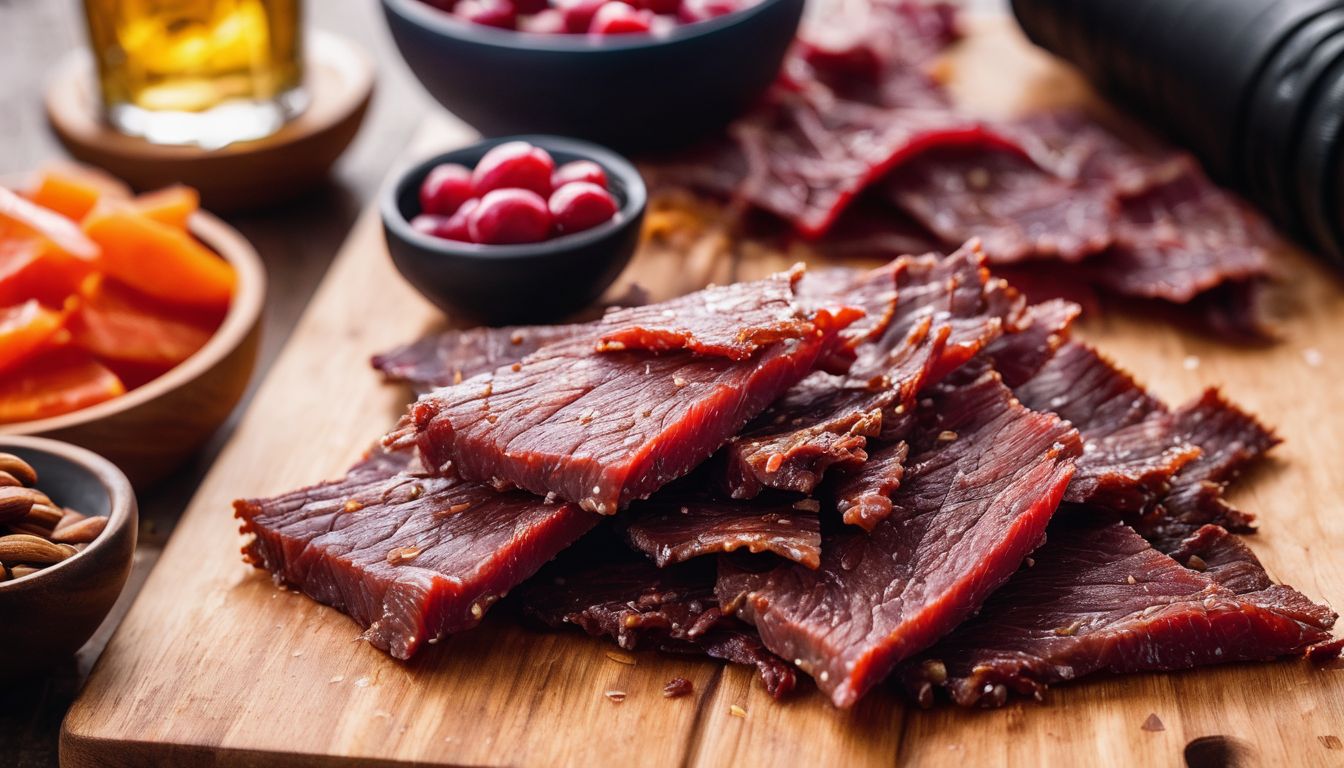
Lean beef jerky stands out as a high protein snack with a serious punch. This nutrient-dense food, packed with essential amino acids, offers nearly 9 grams of protein per ounce. Now, that’s what makes it an amazing addition to any high-protein diet! What’s more? It is incredibly portable and easy to carry around – perfect for those on-the-go moments or mid-workout fuel-ups.
Catering to your protein requirements doesn’t mean adding extra calories. Lean beef jerky proves this by being relatively low in calories while still fulfilling your protein needs.
Moreover, its savory flavor can help curb cravings without sabotaging your dietary goals. Beef jerky also supports muscle-building by supplying the cells with necessary proteins promptly after workouts.
Not only does it stock up on animal proteins but additionally iron which escalates hemoglobin production enhancing oxygen flow throughout the body and boosting overall energy levels!
| – Weight: 30g (1oz) |
| – Calories: 70 kcal |
| – Protein: 12g |
Benefits of Eating High Protein and Low Calorie Foods

High protein and low calorie foods have several benefits, including promoting muscle growth and repair, keeping you feeling full and satisfied, and helping with weight management.
Promotes muscle growth and repair
High protein low-calorie foods play a crucial role in promoting muscle growth and repair. Protein is an essential nutrient that helps to build and repair tissues, including muscles.
When we exercise or engage in physical activity, our muscles undergo stress and damage. Consuming high-protein foods provides the necessary building blocks for repairing and rebuilding these damaged muscles.
Additionally, protein assists in the production of enzymes and hormones that are involved in muscle growth processes. By incorporating high protein low-calorie foods into your diet, you can support optimal muscle development and recovery.
Keeps you feeling full and satisfied
High-protein, low-calorie foods are not only great for promoting weight loss, but they also help to keep you feeling full and satisfied. When you consume foods that are high in protein, such as chicken breast or Greek yogurt, they take longer to digest compared to other nutrients like carbohydrates.
This means that you’ll feel fuller for a longer period of time, reducing the likelihood of snacking on unhealthy foods throughout the day. Additionally, protein has been found to have a greater impact on satiety compared to fat or carbohydrates.
So incorporating these high-protein, low-calorie options into your diet can be an effective strategy for managing hunger and maintaining a healthy weight.
Helps with weight management
High-protein, low-calorie foods can be beneficial for weight management. These foods provide a balance of nutrients while keeping you feeling full and satisfied. They can help curb cravings, prevent overeating, and support healthy weight loss.
Including high-protein, low-calorie options in your diet can contribute to creating a calorie deficit which is essential for shedding excess pounds. By incorporating these foods into your meals and snacks, you can support your weight management goals in a nutritious and satisfying way.
How to Incorporate These Foods into Your Diet
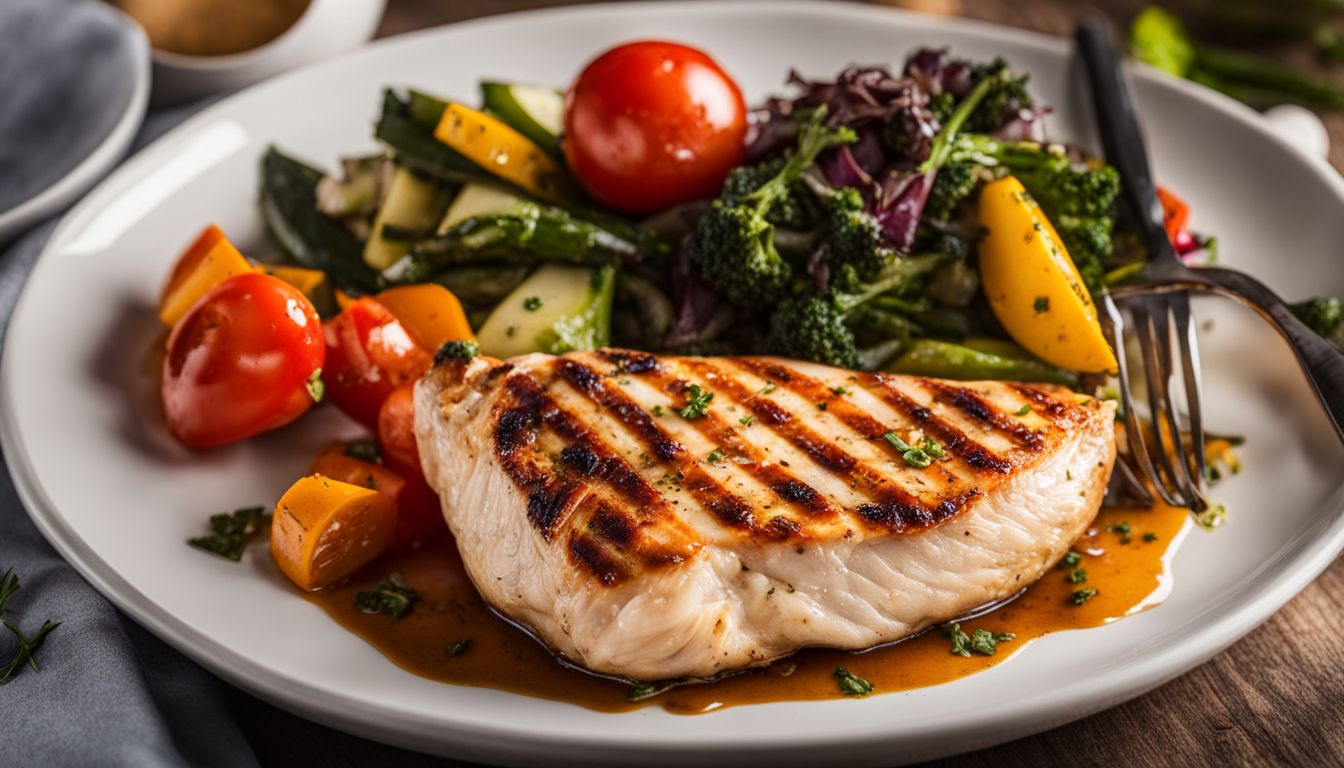
To incorporate these high protein low calorie foods into your diet, try adding grilled chicken breast to salads or stir-fries, enjoy Greek yogurt with fresh fruits for a nutritious snack, or replace ground beef with lean beef in your favorite recipes.
Meal ideas and recipes
Looking for some meal ideas and recipes that incorporate high protein, low calorie foods? Here are a few options to try:
1. Grilled chicken breast with roasted vegetables: Season a skinless chicken breast with your favorite herbs and spices, then grill it until cooked through. Serve it alongside a medley of colorful roasted vegetables like bell peppers, zucchini, and cherry tomatoes.
2. Greek yogurt parfait: Layer non-fat Greek yogurt with fresh berries and a sprinkle of granola or crushed nuts for added crunch. It’s a simple yet satisfying breakfast or snack option that is packed with protein.
3. Tuna salad lettuce wraps: Mix canned tuna with diced celery, red onion, and a tablespoon of light mayonnaise or plain Greek yogurt for a healthier twist. Spoon the mixture onto large lettuce leaves and roll them up for an easy low-calorie lunch.
4. Egg white omelette: Whisk together egg whites with chopped spinach, mushrooms, onions, and bell peppers. Cook the mixture in a non-stick skillet until set and enjoy this protein-packed breakfast option.
Tips for selecting and preparing these foods
When selecting high protein low calorie foods, there are a few key factors to consider. First, opt for lean sources of protein such as skinless chicken breast or turkey breast, as they contain fewer calories and less saturated fat.
Also, choose whole foods like fresh fruits and vegetables instead of processed options to ensure you’re getting the most nutrients with minimal added calories.
In terms of preparation, grilling or baking your proteins is a healthier option compared to frying. This helps retain the natural flavors without adding excess oil or fats. When it comes to beans and lentils, consider soaking them overnight before cooking to reduce their cooking time and make them easier to digest.
How Much Protein Do You Need in a Day?

Calculate your daily protein needs based on factors such as age, gender, weight, and activity level using a protein intake calculator.
Factors that affect protein needs
Factors that can affect your protein needs include:
- Age: Older adults may have higher protein needs to support muscle maintenance and prevent muscle loss.
- Gender: Men generally have higher protein needs compared to women.
- Activity level: Athletes and individuals who engage in intense physical activity may require more protein to support muscle repair and recovery.
- Body weight and composition: People with a higher body weight or more muscle mass may need more protein.
- Health conditions: Certain medical conditions, such as kidney disease or certain types of cancer, may require adjustments to protein intake.
- Pregnancy or breastfeeding: Women who are pregnant or breastfeeding typically need more protein to support the growth and development of the baby.
Protein intake calculator
To determine how much protein you need in a day, use a protein intake calculator. Factors such as age, gender, weight, and activity level all play a role in determining your protein needs.
By inputting this information into the calculator, you can get an estimate of how many grams of protein you should aim to consume daily. This will help ensure that you are meeting your nutritional needs and supporting muscle growth and repair.
Common Myths about Protein

Eating too much protein is not harmful and high protein diets can consist of more than just meat.
Debunking the myth that eating too much protein is harmful
Eating too much protein is a common concern for many people. However, it’s important to debunk the myth that consuming high amounts of protein is harmful. In fact, studies have shown that increasing your protein intake can have numerous benefits for your health, especially when combined with regular exercise.
Protein helps build and repair muscle tissue, supports a healthy metabolism, and keeps you feeling fuller for longer periods of time. While it’s true that excessive protein intake can strain the kidneys in individuals with preexisting kidney conditions, there is no evidence to suggest that a high-protein diet poses any risks to otherwise healthy individuals.
So don’t be afraid to include plenty of protein-rich foods in your diet; just remember to maintain a balanced approach overall.
Dispelling the belief that high protein diets can only consist of meat
High protein diets are often associated with consuming large amounts of meat, but this belief is simply not true. There are plenty of plant-based options that are high in protein and low in calories.
For example, beans and pulses such as black beans and chickpeas provide a good amount of protein while also being affordable sources of nutrition. Additionally, tofu, edamame, and tempeh are excellent vegetarian sources of protein that can be easily incorporated into meals.
So whether you’re a meat lover or prefer plant-based options, there’s no need to limit yourself when it comes to high-protein foods.
Tips for Incorporating High Protein Low Calorie Foods into Your Diet

Choose lean sources of protein such as chicken breast and shrimp, plan balanced meals that include a variety of high protein low calorie foods, and read nutrition labels to understand portion sizes for effective incorporation into your diet.
Planning balanced meals
To ensure that you’re getting the right balance of nutrients, it’s important to plan balanced meals. Include a combination of high protein and low-calorie foods in each meal to keep you satisfied and support your overall health goals.
For example, pair chicken breast with a side of mixed vegetables or combine Greek yogurt with fresh fruit for a nutritious breakfast option. By being mindful about including these types of foods in your meals, you can create satisfying and well-rounded dishes that contribute to your overall wellness.
Choosing lean sources of protein
Lean sources of protein are an important component of a healthy diet. These proteins have lower amounts of saturated fat and fewer calories, making them ideal for weight management and overall health.
Chicken breast is a popular lean protein choice, with 73% of its calories coming from protein. Egg whites are another excellent option, as they contain 85% protein. Other lean sources include turkey, salmon, shrimp, cod, and lean beef.
By incorporating these types of proteins into your meals and snacks, you can enjoy the benefits of high-quality nutrition without excess calories or unhealthy fats.
Reading nutrition labels and understanding portion sizes
Understanding nutrition labels and portion sizes is essential for making informed choices about the foods we consume. Nutrition labels provide valuable information about the calories, protein, fat, carbohydrates, and other nutrients in a particular product.
By reading these labels, we can identify whether a food is high or low in certain nutrients and make adjustments to our diet accordingly. Additionally, understanding portion sizes helps us control how much we eat and manage our calorie intake more effectively.
It allows us to accurately assess the nutritional content of what we are consuming and make healthier decisions about our food choices. So take the time to read nutrition labels carefully and educate yourself about proper portion sizes to support your journey towards a healthy diet.
Conclusion

Incorporating high protein low calorie foods into your diet is a smart choice for promoting muscle growth and managing weight. With options like chicken breast, Greek yogurt, and tofu, there are plenty of delicious choices to satisfy your protein needs without adding excess calories.
Don’t forget about the benefits of incorporating beans, lentils, and shrimp as well. Start enjoying these nutritious foods today and reap the rewards of their health benefits!
FAQs
1. What are foods high in protein but low in calories?
Foods high in protein and low in calories include lean meats, dairy products, seafood, eggs, and certain vegetables.
2. Can I find vegetarian or vegan options that are rich in protein and also low calorie?
Yes! There are plenty of high-protein low-calorie foods for vegetarians and vegans including beans, lentils, tofu and other soy-based products.
3. How can consuming these types of food benefit my diet?
Eating these types of food can help you stay full longer while keeping your calorie intake low which is beneficial for weight loss or maintaining a healthy weight.
4. Are there any specific breakfast items that offer a good balance between being both high protein and low calorie?
Certainly! Many breakfast foods like Greek yogurt, egg whites or whole grain bread with peanut butter are examples of what could be included on a list of high-protein-low-calorie meals to start the day off right.
5. Where can I find some recipes using these kind of ingredients?
You can easily find ample online resources featuring recipes specifically designed around these types of food—providing healthy recipes for cooking at home using this dual-nutrient approach as their backbone ingredient profile!
Sources referenced in this article
- https://www.nutrishopusa.com/learning-center/nutrition-recipes/15-interesting-protein-facts
- https://www.hsph.harvard.edu/nutritionsource/what-should-you-eat/protein/
- https://www.nutrition.org.uk/healthy-sustainable-diets/protein/
- https://bareblends.com.au/blog/14-fun-facts-about-protein
- https://www.medindia.net/health_statistics/health_facts/interesting-protein-facts.htm
- https://www.heaboosters.com/blogs/expert-advice/5-interesting-facts-about-protein-that-you-should-know-hea-boosters
- https://thebalancednutritionist.com/facts-about-protein/

Author
Years ago, the spark of my life’s passion ignited in my mind the moment I stepped into the local gym for the first time. The inaugural bead of perspiration, the initial endeavor, the very first surge of endorphins, and a sense of pride that washed over me post-workout marked the beginning of my deep-seated interest in strength sports, fitness, and sports nutrition. This very curiosity blossomed rapidly into a profound fascination, propelling me to earn a Master’s degree in Physical Education from the Academy of Physical Education in Krakow, followed by a Sports Manager diploma from the Jagiellonian University. My journey of growth led me to gain more specialized qualifications, such as being a certified personal trainer with a focus on sports dietetics, a lifeguard, and an instructor for wellness and corrective gymnastics. Theoretical knowledge paired seamlessly with practical experience, reinforcing my belief that the transformation of individuals under my guidance was also a reflection of my personal growth. This belief holds true even today. Each day, I strive to push the boundaries and explore new realms. These realms gently elevate me to greater heights. The unique combination of passion for my field and the continuous quest for growth fuels my drive to break new ground.


